|
October 2012 Updates
The Temptation of Grace...

[ The following entry is related to this week's Torah reading, parashat Vayera. Please read the Torah portion to find your place here. ]
10.31.12 (Cheshvan 15, 5773) Because so many "Messianic" ministries teach false doctrine, it is vital to remind ourselves that the righteousness of God is manifested apart from the law (χωρὶς νόμου), and that this righteousness was clearly witnessed by the law and the prophets (Rom. 3:21). The Apostle Paul warns that those who attempt to mix the old and new covenants are essentially spiritual adulterers (Rom. 7:4-ff). After all, the goal of the Torah was the New Covenant -- not the other way around (Gal. 3:17-19). The law was given to lead us to the Messiah and His Kingdom rule (Gal. 3:23-26), and indeed, the glory of the Torah of Moses was destined to fade away (2 Cor. 3:3-11), just as its ritual center (i.e., the Tabernacle/Temple) foreshadowed the greater Substance of the priesthood of God (Heb. 10:1; 13:10). "Now we are released from the law, having died to that which held us captive, so that we serve in the new way of the Spirit and not in the old way of the written code (Rom. 7:6). "For what the law could not do, in that it was weak through the flesh, God sending his own Son in the likeness of sinful flesh, and for sin, condemned sin in the flesh: That the righteousness of the law might be fulfilled in us, who walk not after the flesh, but after the Spirit" (Rom. 8:3-4).
Note: For more on this important subject, please see "The Temptation of Grace."
 |
The Ram of God...
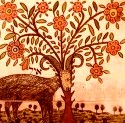
[ The following entry is related to this week's Torah reading, parashat Vayera. Please read the Torah portion to find your place here. ]
10.30.12 (Cheshvan 14, 5773) Consider how important was the ram that was substituted for Isaac... Had Isaac indeed been sacrificed on the altar, the nation of Israel would never have come into existence, and therefore the Messiah Himself would not have come. Therefore God's provision of the ram was meant to substitute and deliver all of Israel, and Isaac's willingness to offer his life foretells the passion and sacrifice of Yeshua. The sages say that the "ashes" of Isaac are gathered before the Throne of Glory, as if his willingness to offer himself is memorialized there forever. However, it is thanks to the ram (i.e., the lamb of God), that both Isaac and his merit as an offering survived the great test. Worthy is the Lamb who was slain! The cross is forever before God's Throne of Grace for us, chaverim.
In light of the sacrifice of Abraham's "only son" Isaac upon the altar at Moriah (i.e., the Akedah), we have all the more reason to affirm the glory of Yeshua our Messiah, the great Lamb of God (שֵׂה הָאֱלהִים) who takes away the sins of the world:
רָאוּי הַשֶּׂה הַטָּבוּחַ לְקַבֵּל גְבוּרָה
עשֶׁר וְחָכְמָה וְכּחַ וִיקַר וְכָבוֹד וּבְרָכָה
ra·uy · has·seh · ha·ta·vu·ach · le·ka·bel · ge·vu·rah,
o·sher · ve·chokh·mah · ve·ko·ach · vi·kar · ve·kha·vod · uv·ra·kha

"Worthy is the Lamb who was slain, to receive power and wealth and wisdom
and might and honor and glory and blessing" (Rev. 5:12)

Download Reading Card
Note: for more on this, see the "Passion of Isaac."
Being Honest with God...
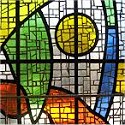
10.30.12 (Cheshvan 14, 5773) The moment you sense pride taking hold of your heart, stop and turn to God. Even if you must turn 70 x 7 times, there is hope, since even the desire of "being willing to do God's will" refines the heart. It is far better to be repeatedly turning to God in brokenness than it is to live under the pretense that you have no need for ongoing deliverance. It has been wisely said that "you cannot widen the narrow way of surrender." Religious people are perhaps most at risk here, since often enough they fool themselves into believing that passionate commitment requires they know everything about God, or that they are walking in joy and victory, when the truth is that they are often lonely, hurting, and sometimes unsure of themselves...
I wonder why people are afraid to admit they don't know something, or that they are confused, or sad, or troubled, etc. Any religion that demands its adherents to always be "up" and is simply untrue to the human condition. Reread the Psalms or consider the dark walk of faith that many of our forefathers and foremothers underwent. God wants all our hearts, chaverim, not just the parts we think he wants....
"By the grace of God I am what I am" (χάριτι δὲ θεοῦ εἰμι ὅ εἰμι). "Face the facts of being what you are, for that is what changes what you are" (Kierkegaard). And only until you can hear, "Never change! I love you just the way you are," will you be free to face who you are. "Now, with God's help, I shall become myself."
 |
The Angel of the LORD...

[ The following entry is related to this week's Torah reading, parashat Vayera. Please read the Torah portion to find your place here. ]
10.30.12 (Cheshvan 14, 5773) In Hebrew, an "angel" is called malakh (מַלְאַךְ), a word that basically means "messenger" or "representative" (from the root לאך, meaning "to send"). God created many angels, of course (Psalm 68:17, 103:20), but there there is one Malakh who stands out from all the rest of the malakhim (angels) as a King stands above his subjects. This "King of Angels" is called Malakh Adonai (מַלְאַךְ יהוה), or "the Angel of the LORD." Unlike the other angels that function as emissaries of God, Malakh Adonai is the supreme representation or Message of God Himself. His Word/Voice is "one" with the Person of God, just as the Spirit of God is "one" with the Person of God. Since the glory and power of God's infinite Being is incomprehensible to finite creatures, the Angel of the LORD is a form of God's condescension in a visible or audible manner so that an angel or a human being can apprehend His message.... And since Yeshua is the "radiance of the glory of God and the exact imprint of his nature, who upholds the universe by the word of his power" (Heb. 1:3), it is clear that He is none other than the Angel of God's face -- the "message of God" -- that was "sent" (לאך) in human flesh (John 1:1,14).
Note: For more on the Angel of the LORD, please click here.
 |
Allow yourself to be loved...
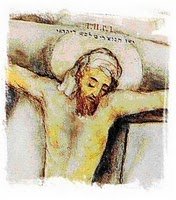
10.29.12 (Cheshvan 13, 5773) Sometimes it is easier to love others than to allow yourself to be loved. If you believe you are unworthy, you may feel the need to "repay" the one who loves you, as if love was a sort of "transaction" and you stand as its debtor... Or you may feel insecure, suspecting that if you were turned inside-out, and all your secrets were disclosed, love's concern would withdraw. But true love gives unconditionally, and therefore God's love for you is essential to who God is. You must receive the good news that God's love is for you. When you accept that you are accepted, when you understand that you are loved despite your secret sins, then you begin walking as a child of God...
The Way of Deliverance...

10.29.12 (Cheshvan 13, 5773) God's way of deliverance is entirely different than man's way. Man tries to suppress the flesh, to cover it up, to justify its failings, or to enlist its power in the battle against sin (i.e., religion), but God's way is to remove the flesh from the equation. The goal is not to make us stronger and stronger, but rather weaker and weaker, until the flesh is crucified and only the sufficiency of the Messiah remains. Then we can truly say, "I have been crucified with Messiah. It is no longer I who live, but the Messiah who lives in me. And the life I now live in the flesh I live by faith in the Son of God, who loved me and gave himself for me" (Gal 2:20). The word "Hebrew" (עִבְרִי) means one who has "crossed over" (עָבַר) to the other side, as our father Abraham did (Gen. 14:13). It is on the other side of the cross that we experience the very power that created the universe "out of nothing" (i.e., yesh me'ayin: יֵשׁ מֵאַיִן) and that raised Yeshua the Messiah from the dead.
 |
Parashat Vayera - וירא
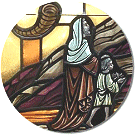
[ The following entry is related to this week's Torah reading, parashat Vayera. Please read the Torah portion to find your place here. ]
10.28.12 (Cheshvan 12, 5773) In last week's Torah (Lekh Lekha), we saw how the LORD spoke to Abram and invited him to forsake his ancestral home for the promise of God. In obedience to the call of the Word of the LORD, Abram left his homeland, his family, and his father's house to seek a better life - "for he was looking forward to the city that has foundations, whose architect and builder is God" (Heb. 11:10). But notice that it was only after Abram made the long journey into the unknown land of Canaan that God appeared to him saying, "To your offspring I will give this land" (Gen. 12:1-7). In other words, Abraham did not believe the promise because he saw God; but he was able to see God after he had walked in faith.... His faith in God enabled him to see God's hand, not the other way around. The principle of believing in order to understand is central to the walk of faith in this world.
Our Torah reading for this week (Vayera) includes what I call the "Gospel according to Moses," or rather Moses' account of how Abraham was tested by God to offer his "only begotten son" (בֵּן יָחִיד) as a sacrifice on Mount Moriah -- the place of the future Temple. This famous story is referred to as the Akedah (עֲקֵדָה), or Akedat Yitzchak (עֲקֵידָת יִצְחָק) - the "binding of Isaac" (Gen. 22:1-18). At the very last moment, the Angel of the LORD stopped Abraham from going through with the sacrifice and provided a ram as a substitute. Abraham then named the location Adonai-Yireh (יהוה יִרְאֶה), "the LORD will provide/see" (from the 3p impf. of the verb ra'ah (רָאָה), "to see"). The binding of Isaac perfectly illustrates both the principle of sacrificial love and the principle that we must first unreservedly believe in that love in order to understand the ways of the LORD. God will provide - His Son!
As Messianic believers, we understand the Akedah as a foreshadowing of the ultimate sacrifice the heavenly Father would give on our behalf. Unlike Abraham, God the Father actually offered His only begotten Son (בֵּן יָחִיד) Yeshua upon Moriah in order to make salvation available to all who believe (John 3:16-18; 1 John 4:9). As Abraham himself believed: אֱלהִים יִרְאֶה־לּוֹ הַשֶּׂה / Elohim yireh-lo haseh ("God Himself will provide a lamb").
אֱלהִים יִרְאֶה־לּוֹ הַשֶּׂה לְעלָה בְּנִי
E·lo·him · yir·eh-lo · has·seh · le·o·lah · be·ni

"God will see for himself the lamb for the burnt offering, my son."
(Gen. 22:8)
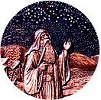
It bears repeating, so briefly consider how the Akedah provides a prophetic picture of Yeshua as the "Lamb of God" (Seh haElohim) who takes away the sins of the world (John 1:29). Both Isaac and Yeshua were born miraculously; both were "only begotten sons"; both were to be sacrificed by their fathers at Mount Moriah; both experienced a "passion"; both were to be resurrected on the third day (Gen. 22:5, Heb. 11:17-19); both willingly took up the means of his execution; and both demonstrate that one life can be sacrificed for another – the ram for Isaac, and Yeshua for all of mankind. Indeed, Isaac is a clear picture of the Greater Seed of Abraham to come, the One who would remove the kelalah (curse) and save us from death.
The very first occurrence of the word love in the Scriptures (i.e., ahavah: אַהֲבָה) refers to Abraham's love for his "only" son who was to be sacrificed as a burnt offering on Moriah (the very place of the crucifixion of Yeshua), a clear reference to the gospel message (Gen. 22:2; John 3:16). Some scholars have noted that the word ahavah comes from a two-letter root (הב) with Aleph (א) as a modifier. The root means "to give" and the Aleph indicates agency: "I" give (i.e., the Father gives). Love is essentially an act of sacrificial giving... The quintessential passage of Scripture regarding love (αγαπη) in the life of a Christian is found 1 Corinthians 13: "Love seeks not its own..."
Whereas the Akedat Yitzchak foreshadowed God's provision for the coming Temple, the Akedat Yeshua (i.e., the crucifixion of Yeshua at Moriah) was the altar where the justice and chesed (love) of the Father fully met. For more on this incredibly rich subject, please see the articles, "The Passion of Isaac" and "The Sacrificed Seed."
 |
Covenant and Love...

[ The following entry is related to this week's Torah reading, parashat Lekh-Lekha.... ]
10.26.12 (Cheshvan 10, 5773) In Genesis chapter 17, God confirmed his covenant with Abraham by giving him the rite of circumcision, that is, brit milah (בְּרִית מִילָּה), a term that literally means "covenant of the word." It is important to note that the rite of circumcision never was intended to effect the promise of God but only to attest to it. Circumcision served as sign or token of faith in the word of the LORD, that is, in God's loving promise. We see the connection by noting that the word "covenant" (i.e., brit: בְּרִית) appears exactly 13 times during this dramatic episode (i.e., Gen. 17:1-22), which is the same numeric value as the Hebrew word for love (i.e., ahavah: אַהֲבָה). Further note that the last occurrence of the word "covenant" in this section concerns God's exclusive choice of Isaac, Abraham's only true heir, the promised child who was chosen to be the "sacrificed seed" (Gen. 17:21). Indeed the very first time the word "love" appears in the Bible occurs when God asks Abraham to take his son, his "beloved" son, and to offer him as a whole burnt offering (Gen. 22:2), a clear picture of the sacrificial message of Yeshua the Messiah:
"Please take your son... קַח־נָא אֶת־בִּנְךָ
your only son... אֶת־יְחִידְךָ
the one whom you love... אֲשֶׁר־אָהַבְתָּ
even Isaac... אֶת־יִצְחָק
and go to the land of Moriah and offer him as a burnt offering.
Note: For more on this subject, see "The Gospel According to Moses," "The Seed of Abraham," "The Sacrificed Seed," and related links on the Akedah.
Life out of Death...
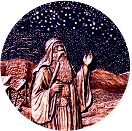
[ The following entry is related to this week's Torah reading, parashat Lekh-Lekha.... ]
10.26.12 (Cheshvan 10, 5773) When Abram was ninety-nine years old the LORD appeared to him and said, "I am El Shaddai (אֲנִי־אֵל שַׁדַּי); walk before me, and be perfect" (Gen. 17:1). Since the name El Shaddai depicts the image of a nursing mother (see below), perhaps this revelation was meant to remind Abram and Sarai that God would be the Womb, the Sustenance, and the Substance of the coming promised Seed. Only God can bring life out of death - even life from the deadness of Sarai's womb (Rom. 4:19). For this reason, both Sarai and Abram were renamed by adding the letter Hey (ה), a letter that symbolizes the Holy Spirit of God. The promised Seed was to be born miraculously, not unlike the virgin birth of the Messiah reported in the Gospels.
וַיּאמֶר אֵלָיו אֲנִי־אֵל שַׁדַּי
הִתְהַלֵּךְ לְפָנַי וֶהְיֵה תָמִים
vai·yo·mer · e·lav · a·ni · El · Shad·dai
hit·ha·lekh · le·fa·nai · ye·he·yeh · ta·mim

And He said to him [Abram]: "I am El Shaddai, walk before Me and be perfect
[i.e., complete in faith, mature, wholehearted]"
(Gen. 17:1)

Hagar and Sarah's Children...

[ The following entry is related to this week's Torah reading, parashat Lekh-Lekha.... ]
10.26.12 (Cheshvan 10, 5773) Abraham had two sons: Ishmael (יִשְׁמָעֵאל), the son of the slave Hagar (who, according to tradition was a daughter of Pharaoh), and Isaac (יִצְחָק), the son of his wife Sarah. Ishmael's conception was "natural," i.e., was "of the flesh" and the result of human intervention and calculation; Isaac's conception, on the other hand, was supernatural and the result of God's miraculous intervention and design. Paul interprets the two family lines in allegorical terms. The two mothers "represent" two distinct covenants: Hagar represents the covenant made at Sinai that results in "children born of slavery," whereas Sarah represents the covenant made earlier based on divine promise that results in freeborn children (Gal. 4:24-27). Mount Sinai is in the barren desert, but Mount Zion/Jerusalem (representing the fulfilled promise) is in the "land flowing with milk and honey" -- the goal of a people that is divinely elected.
Note: Abraham has more identifiable descendants than any other person in history... From the line of Isaac would come the twelve tribes of the Jewish people (as well as all those Gentiles who have been grafted into the covenantal blessings of Israel, i.e., the "church"), and from Ishmael would come the twelve tribes of the Ishmaelite people. Abraham also later married Keturah who bore him six more sons that became founders of six other nations of the Arab world, including the Midianites. To signify Abram's status, God changed his name from Avram ("exalted father" [from אָב, "father," + רָם, "exalted"]) to Avraham ("father of a multitude," a homonymic wordplay from אָב, "father" + המוֹן, "crowd"). Notice that some regard Avraham's name to mean "father of mercy" (from אָב, "father" + רחם, "womb"). For a bit more on this subject, see "Paul's Allegory of Hagar and Sarah."
 |
An Unconditional Promise...

[ The following entry is related to this week's Torah reading, parashat Lekh-Lekha.... ]
10.26.12 (Cheshvan 10, 5773) When Abram asked how he could know that he would inherit the land of Canaan (Gen. 15:8), God ratified his promise with a covenant ceremony, which served as a sort of "sworn contract." In ancient times, a common way to make a solemn covenant was for two parties to lay their hands on the head of a sacrificial animal that was then slaughtered and divided into pieces. Each party of the contract would then hold hands as they walked between the pieces, pledging themselves to the terms of the agreement (Jer. 34:18). In the case of Abram, however, the covenant to inherit the land was clearly unconditional, since after slaughtering the animals he fell into a deep trance (תַּרְדֵּמָה) that immobilized him and rendered him powerless to act. When he awoke from the trance, he saw God walking alone between the pieces (Gen. 15:17). God made a unilateral promise to give the land to Abram, and Abram was simply to keep faith in God's word...
The "Abraham covenant" i.e., the "Covenant Between the Parts" (בְּרִית בֵּין הַבְּתָרִים), is clearly an unconditional and unilateral covenant established by means of the oath of God Almighty. Note that the "smoking furnace" alludes to the altar at the Tabernacle, as the "flaming torch" alludes to the menorah in the Holy Place. These both picture the altar of the cross and the Light of the World given in Yeshua. Like Abram, we find ourselves in a trancelike state, unable to do the sacrifice, but God only asks that we keep faith in Him. Those who want to impugn God's plan for ethnic Israel need to remember that if God could break his promise to Abram, he could likewise break his promise to the church...
Note also that the boundaries of the land promised to Abram are described as being "from the river of Egypt (Nile) to the great river, the river Euphrates" (Gen. 15:18), an area of land that was never fully possessed by the Jewish people, even during the reign of king Solomon. This "greater Israel" will indeed be given to the Jewish people as their homeland during the time of the Millennial Kingdom, when Yeshua establishes Zion upon the earth...
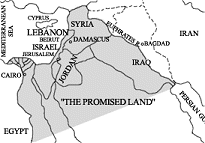 |
 |
An "Impossible" Blessing...

[ The following entry is related to this week's Torah reading, parashat Lekh-Lekha.... ]
10.26.12 (Cheshvan 10, 5773) "After these things the Word of the LORD (דְּבַר־יְהוָה) came to Abram in a vision: al-tirah Avram (אַל־תִּירָא אַבְרָם) - "fear not, Abram," anochi magen lakh (אָנכִי מָגֵן לָךְ) - "I am a Shield for you, and your reward shall be very great" (Gen. 15:1). Perhaps the LORD said He was Abram's "shield" in light of his miraculous victory over the kings of the east; and perhaps the LORD said he was Abram's great reward because Abram had refused any reward offered to him by the king of Sodom... At any rate, in response to God's wonderful words, Abram made his appeal to God for an heir to his family, that is, for the son promised to him earlier by God (see Gen. 12:1-3; 13:14-17).
When Abraham made his heartfelt appeal to God for the son repeatedly promised to him, the LORD led him outside to behold the night sky: "Look toward heaven, and number the stars, if you are able to number them." Then he said to him, "So shall your offspring be." And Abram believed the LORD, and He counted it to him as righteousness" (Gen. 15:5-6). Abram believed what God said he would do - despite the seemingly impossible circumstances – just as we likewise trust God's promise for an "impossible" mercy and grace that justifies the ungodly (see Rom. 4:1-5; Gal. 3:6-9).
וְהֶאֱמִן בַּיהוָה וַיַּחְשְׁבֶהָ לּוֹ צְדָקָה
ve·he·e·min · ba·do·nai · vai·yach·she·ve·ha · lo · tze·da·kah

"And he [Abram] trusted in the LORD,
and he [the LORD] counted it to him as righteousness."
(Gen. 15:6)

Just as Abram was declared righteous (i.e., tzaddik: צַדִּיק) because he believed the promise of an "impossible son" to come, so we likewise are declared righteous when we believe the promise of God's "impossible" love for sinners like us... This is the basic idea of being "justified by faith." We trust that God's word is true and that we are made acceptable to Him because of Yeshua.
Notice, however, that Abram believed the LORD's promise, despite the absence of any present evidence and indeed despite the seemingly impossible circumstances of his life. The repeated promise made to him was meant to "slay expectancy that might pause to look for present fulfillment," yet Abram's unwavering trust became a settled conviction, not a suspenseful state of waiting (which is fueled by doubt). Note further that Abram was accounted righteous (tzaddik) for trusting in God, which of course implies that he was not righteous otherwise, and which therefore reinforces that we are justified by God when we trust for his "impossible" mercy and grace... Abram, like us, was declared righteous not because he was faithful (i.e., through acts of obedience), but rather by trusting in the LORD who has the love, power and means to justify the ungodly.
כִּי שֶׁמֶשׁ וּמָגֵן יְהוָה אֱלהִים
חֵן וְכָבוֹד יִתֵּן יְהוָה
לא יִמְנַע־טוֹב לַהלְכִים בְּתָמִים
יְהוָה צְבָאוֹת אַשְׁרֵי אָדָם בּטֵחַ בָּךְ
ki · she·mesh · u'ma·gen · Adonai · Elohim
chen · ve'kha·vod · yit·ten · Adonai
lo · yimna-tov · la-cho·le·khim · be'tamim
Adonai · Tze·va·ot · ash·rei · a·dam · bo·te'ach · bakh

"For the LORD God is a sun and shield;
the LORD bestows grace and honor.
No good thing does he withhold from those who walk wholeheartedly.
O LORD of hosts, blessed is the one who trusts in you!"
(Psalm 84:11-12)
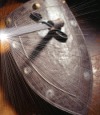
The Original Priest of Torah...
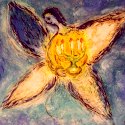
[ The following entry is related to this week's Torah reading, parashat Lekh-Lekha.... ]
10.26.12 (Cheshvan 10, 5773) Our Torah portion this week reveals that the very first "priest" (i.e., kohen: כּהֵן) of the Scriptures was neither a Jew nor a Levite nor a descendant of Aaron, but instead Someone who had "neither beginning of days nor end of life" but is made like (ἀφωμοιωμένος) the Son of God, a priest continually (Heb. 7:3). This great priest, of course, was Malki-Tzedek (מַלְכִּי־צֶדֶק), the King of Shalem (מֶלֶךְ שָׁלֵם), or the "King of Healing," to whom Abram offered tithes after his victory over the kings (Gen. 14:18). Malki-Tzedek is called the priest of El Elyon (אֵל עֶלְיוֹן), the "Ascended God," which of course points to the resurrection and ascension of Yeshua. Indeed, it is profoundly prophetic how Abram was met by the Coming One as the Priest of the Most High God in the City of Zion, and how there he presented him the tokens of bread and wine - the same tokens Yeshua gave to His disciples as a witness of His sacrificial mediation for their sins (1 Cor. 11:23-26).
 |
The Hebrew word for priest (i.e., kohen: כּהֵן) may come from the word ken (כֵּן) meaning "yes" and the word kivun (כִּווּן) meaning to "direct" or "lead," implying that a priest helps direct a person toward God. The author of the Book of Hebrews cogently argues that the priesthood of Malki-Tzedek is greater than that of sons of Aaron since it precedes it both in time and in significancer, as evidenced when Abraham (and therefore Levi) offered him tribute (Heb. 7:9-11). In this connection it is wonderful to see how Yeshua functions as our great High Priest of the New Covenant, who is able to save to the "uttermost" those who draw near to God through Him, since He always lives to intercede (i.e., ἐντυγχάνειν, to plead, entreat) on their behalf" (Heb. 7:25). As our Kohen Gadol of the New Covenant, "all the promises of God find their "Yes" in him. That is why it is through him that we utter our 'amen' to God for his glory" (2 Cor. 1:20).
As I've mentioned before, the nature of Yeshua's work as our Mediator, our High Priest, is based on a covenant that is both older than the covenant given at Sinai and yet is newer, in the sense that its ministry was initiated with the advent of Yeshua the Messiah. Indeed, the Levitical priesthood "made nothing perfect" and therefore a "new priesthood" was required to finally reconcile us back to God (Psalm 110:4). As it is written, "For when there is a change (μετατιθεμένης) in the priesthood (הַכְּהוּנָּה), there is necessarily (ἀνάγκη) a change (μετάθεσις) in the law as well" (Heb. 7:12). The word translated "change" here comes from the verb μετατίθημι (from meta, "after" + tithemi, to "set") which would be better translated as "transposed." The idea is the priesthood reverted back to the original priesthood of Zion (i.e., given through the priesthood represented by Malki-Tzedek) and therefore required a corresponding "transfer" of authority (μετάθεσις) to the original kingship as well (since Malki-Tzedek was the original king of Zion). Yeshua is our great High Priest after the order of Malki-Tzedek (Heb. 5:10, 6:20; 7:1-28), just as He is our King and the final authority of the Torah. Those who follow Him are called to be mamlekhet kohanim v'goy kadosh, "a kingdom of priests and a holy nation" forever (Exod. 19:6, 1 Pet. 2:9, Rev. 1:6, 5:10). Followers of Yeshua have an altar "from which those who serve in the Tabernacle are not permitted to eat" (Heb. 13:10). The Levitical priesthood expresses the Torah of the Covenant of Sinai (בְּרִית יְשָׁנָה), just as the greater priesthood of Yeshua expresses the Torah of the New Covenant (בְּרִית חֲדָשָׁה). And just as Moses "stood outside" the religious system to declare revelation, so Yeshua was a prophet "like unto Moses" who mediated the truth of the new covenant to Israel and to the entire world... We therefore reject the false dichotomy of "Moses or Jesus" -- we have both, chaverim...
Note: For more on this subject, see "Exploring the Identity of Malki-Tzedek."
 |
Walking by Faith, not by Sight...

[ The following entry is related to this week's Torah reading, parashat Lekh-Lekha.... ]
10.25.12 (Cheshvan 9, 5773) Our Torah portion this week states, "And the LORD appeared to Abram and said, "To your offspring I will give this land" (Gen. 12:7). Note that this was the first time God actually appeared to Abram, since earlier he had only "heard" God say to him, "Go from your country and your kindred and your father's house to the land that I will show you" (Gen. 12:1). In other words, it was only later - after Abram had obeyed God's voice by making the move to Canaan, that the LORD appeared to him and an altar was established (Gen. 12:7-8). As long as he remained with his father in the City of Haran (the last outpost of Mesopotamia), he was in a place of delay, unable to see the Divine Presence. Abram first had to act on what he knew before he was given confirmation by God. Perhaps that is why the very first place Abram came to in the promised land was the "Oak of Moreh" (אֵלוֹן מוֹרֶה), or the "Teaching Tree." Abram was taught that to believe in order to understand, not to understand in order to believe....
Notice, however, that Abram was immediately tested once he arrived in the promised land. After building another altar and calling upon the name of the LORD (Gen. 12:8), a severe famine tempted him to look for food in the land of Egypt. After leaving the land of promise, Abram willingly forfeited his identity (i.e., he denied he was Sarai's husband) and found himself powerless as his wife was abducted into Pharaoh's harem. The LORD intervened on his behalf, however, and plagued Pharaoh and his household with great plagues, which surely prefigured the future time of the great Exodus during the time of Moses.
In this connection we note that the next time the LORD appeared to Abram was after he had returned from Egypt, after rescuing Lot from the kings of the east, where he encountered the mysterious Malki-Tzedek (מַלְכִּי־צֶדֶק) in Salem. After this dramatic encounter, Abram separated his clan from his nephew Lot and returned to the first altar he built in the promised land (Gen. 13:4).
 |
Relying on God's Strength...

10.25.12 (Cheshvan 9, 5773) "We felt that we had received the sentence of death; but that was to make us rely not on ourselves, but on God who raises the dead" (2 Cor 1:9). The flesh bears its own witness of powerlessness to our spirit. The experience of knowing God's strength through our weaknesses reminds us that He works within us, despite ourselves. Even in the sting of failure, in a moment of pain or shame, it's as if God sweetly questions, "Do you see, do you understand now ..... that you are loved?"
It is written, "The world is built in chesed," olam chesed yibaneh (עוֹלָם חֶסֶד יִבָּנֶה), which means that our inner life is being built by God's love... "So we do not lose heart. Though our outer self is wasting away, our inner self is being renewed day by day. For this light momentary affliction is preparing for us an eternal weight of glory beyond all comparison, as we look not to the things that are seen but to the things that are unseen. For the things that are seen are transient, but the things that are unseen are eternal" (2 Cor. 4:16-19).
 |
The LORD as El Shaddai...

[ The following entry is related to this week's Torah reading, parashat Lekh-Lekha.... ]
10.24.12 (Cheshvan 8, 5773) In this week's Torah (Lekh Lekha), the LORD described Himself using the name El Shaddai (אֵל שַׁדַּי), often mistranslated as "God Almighty." In Genesis 17:1, YHVH said to Abram: "I am El Shaddai. Walk before me and be perfect." But why did the LORD choose to reveal Himself using this distinctive name to Abram?
Most English translations render El Shaddai as "God Almighty," probably because the translators of the Septuagint (i.e., the ancient Greek translation of the Old Testament) thought Shaddai came from a root verb (shadad: שָׁדַד) that means "to overpower" or "to destroy." The Latin Vulgate likewise translated Shaddai as "Omnipotens" (from which we get our English word omnipotent). In other words, the translators regarded this term to suggest that God is so overpowering that He is considered "Almighty."
According to the Jewish sages, however, Shaddai is a contraction of the phrase, "I said to the world, dai (enough)" (as in the famous word used in the Passover Haggadah, Dayeinu -- "it would have been sufficient"). God created the world but "stopped" at a certain point. He left creation "unfinished" because He wanted us to complete the job by means of exercising chesed (love) in repair of the world (tikkun olam).
Jacob's blessing given in Genesis 49:25, however, indicates that Shaddai might be related to the word for breasts (shadaim), indicating sufficiency and nourishment (i.e., "blessings of the breasts and of the womb" (בִּרְכת שָׁדַיִם וָרָחַם)). In this case, the Name might derive from the contraction of sha ("who") and dai ("enough") to indicate God's complete sufficiency to nurture the fledgling nation into fruitfulness. Indeed, God first uses this Name when He refers to multiplying Abraham's offspring (Gen. 17:2). Understood in this light, the name El Shaddai provides a picture of God's nurturing love for our lives... God sustains us and loves us, like a mother loves her newborn child...
El Shaddai is used almost exclusively in reference to the three great patriarchs: Abraham, Isaac, and Jacob, and (according to Exodus 6:2-3) was the primary name by which God was known to the founders of Israel (the name YHVH given to Moses suggests God's absolute self-sufficiency, whereas the name Elohim suggests God's soverign power). The word "Shaddai" (by itself) was used later by the prophets (e.g., Num. 24:4; Isa. 13:6, Ezek. 1:24) as well as in the books of Job, Ruth, and in the Psalms. In modern Judaism, Shaddai is also thought to be an acronym for the phrase Shomer daltot Yisrael - "Guardian of the doors of Israel" - abbreviated as the letter Shin on most mezuzot:
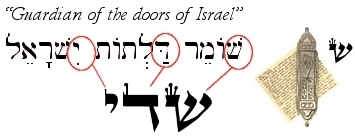 |
Note: While the name El Shaddai presents a "feminine image" of the LORD, this is assuredly appropriate, since God created both genders as a reflection of His image, as it is written: "God created man in his own image, in the image of God he created him; male and female (זָכָר וּנְקֵבָה) he created them (Gen. 1:27). However, some people have made the dubious suggestion that El Shaddai should further be translated as "the many breasted One," even though such language suggests the abominable practices and idols common in various ancient fertility cults - customs that were later subject to the most severe judgment of God upon the seven Canaanite nations. It should be clear, in light of the overall context of the revelation given in the Torah, that the name El Shaddai is directly connected with the sanctity of the promise given to Abraham regarding the future growth of his family, and ultimately of the coming of the promised Seed, the Messiah...
Created for the Messiah...
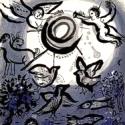
[ The following entry is related to this week's Torah reading, parashat Lekh-Lekha.... ]
10.24.12 (Cheshvan 8, 5773) The sages say that the departure of Abraham from his country, kindred, and his father's house represented a sort of "third creation," after the first account given in Genesis and the rebirth of the world after the flood. The midrash says that the world itself was created for the sake of Abraham's progeny: Where is is written, "These are the generations of the heavens and the earth when they were created" (Gen. 2:4), the letters of the word translated "when they were created" (i.e., be'hibaram: בְּהִבָּרְאָם) can be rearranged to spell "in Abraham" (i.e., בְּאַבְרָהָם), which suggests that the world was created for the sake of Abraham's seed, that is, the Messiah.
The Talmud states that "all the world was created for the Messiah" (Sanhedrin 98b). The New Testament had earlier said the same thing: "All things were created by Him (i.e., Yeshua), and for Him" and in Him all things consist (συνεστηκεν, lit. "stick together") (Col. 1:16-17). Indeed, all of creation is being constantly upheld by the word of the Messiah's power (Heb. 1:3). Creation begins and ends with the redemptive love of God as manifested in the Person of Yeshua our LORD... The Messiah is the Center of Creation - its beginning and end. As it is written: אָנכִי אָלֶף וְתָו רִאשׁוֹן וְאַחֲרוֹן ראשׁ וָסוֹף / "I am the 'Aleph' and the 'Tav,' the First and the Last, the Beginning and the End" (Rev. 22:13). "For from him and through him and to him are all things. To him be glory forever. Amen" (Rom. 11:36).
Yeshua our Messiah is called מֶלֶךְ מַלְכֵי הַמְּלָכִים / Melech Malchei Hamelachim: The "King of kings of kings." He is LORD of all possible worlds -- from the highest celestial glory to the dust of death upon a cross. יְהִי שֵׁם יהוה מְברָךְ / yehi shem Adonai mevorakh: "Let the Name of the LORD be blessed" forever and ever (Psalm 113:2).
 |
Father of all who believe...

[ The following entry is related to this week's Torah reading, parashat Lekh-Lekha.... ]
10.24.12 (Cheshvan 8, 5773) Abraham is traditionally regarded as the first Jew, but the truth is that he was a "Gentile," the son of an idolater (Josh. 24:2), who heard God's voice and then began his pilgrimage of faith to the land of promise (Heb. 11:8-11). Moreover, God personally chose Abraham, promising to make him into a blessing, while he was not yet circumcised, and it was only later, after he sacrificed his beloved son Isaac (i.e., the Akedah) that he was promised that in his Seed (זֶרַע) shall all the nations of the earth be blessed (Gen. 22:18). It was the faith of Abraham - especially as demonstrated by the Akedah - that prefigured the justification of the nations through faith. This is the Gospel of Moses which Yeshua alluded (John 5:46). Therefore we read: "And the Scripture, foreseeing (προοράω) that God would justify the nations by faith, proclaimed the gospel beforehand to Abraham, saying, "In you shall all the nations be blessed" (Gal. 3:9). In other words, God's great plan of salvation was from the beginning for all the nations of the earth to be redeemed.
If you understand Jewish thinking on the subject (as opposed to Gentile thinking), Abraham was regarded as the first Jew because he received the rite of brit millah (circumcision). That was the Apostle Paul's understanding as well, as well as the point he made that Abraham was the father of faith for both Jew and non-Jew: "He [Abraham] received the sign of circumcision as a seal of the righteousness that he had by faith while he was still uncircumcised. The purpose was to make him the father of all who believe without being circumcised, so that righteousness would be counted to them as well, and to make him the father of the circumcised who are not merely circumcised but who also walk in the footsteps of the faith that our father Abraham had before he was circumcised" (Rom. 4:11-12).
 |
Accepting God's Grace...

10.23.12 (Cheshvan 7, 5773) Though God's grace is free, it is nevertheless costly and infinitely priceless, and for that reason it is difficult to accept. We instinctively do not want to admit our need, our helplessness, and the fact that we cannot save ourselves. We can't seem to believe that love can be truly unconditional, so we try to make something of ourselves, seeking to find something that might justify God's love for us (e.g., our religious activities, our morality, our positive outlook, etc.). Nonetheless the principle of grace remains: "Now to the one who works, his wages are not counted as a gift but as his due, but to the one who does not work but believes in him who justifies the ungodly, his faith is counted as righteousness (Rom. 4:4-5). Grace is therefore the very opposite of merit and therefore is the negation of the principle of what is owed or due. As such, any "religion" based on the principle of works is inherently a merit-based system that requires either payment or penalty by way of contractual obligation. The only way to be released from the terms of the contract is through its dissolution (Rom. 7:1-4). If God's mercy means not getting what you deserve (i.e., punishment), then God's grace means getting what you don't deserve (i.e., love).
A corollary of this is that there is no greater impediment to the reception of grace within the heart than the thought that we are decent persons who have worth apart from God's unconditional love. Grace means being healed of our self-inflicted pride, the hardness of heart that refuses to relent and allow God's love to be all we need. It is both tragic and ironic, is it not, that hardness of heart can be readily disguised as a form of human virtue.
 |
Forsaking Self-hatred...
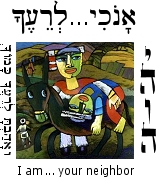
10.23.12 (Cheshvan 7, 5773) Allow God to love you. There is nothing left for you to do other than to open your heart and receive. "It is finished," were Yeshua's last words from the cross, meaning, "It has been perfected - it is complete and present for you; there is nothing left to add." Never, ever, give up hope; never believe that you are beyond the reach of God's love. Even in your worst moments, and despite your character defects and your many sins, God's sees what is beautiful and worthy of redemption in you. Yeshua stands at the door and knocks, asking for you to open the door of your heart to receive his love...
When we open our hearts to God's love and Presence, we are set free from the need to justify ourselves or to be admired by others; we let go of our fear of rejection and our hopeless perfectionism because we no longer need the acceptance or approval of others to understand our worth. God's love sets us free from the trap of comparing ourselves to others, and we are free to accept that we are accepted for who we are.
It is a terrifying possibility that we can disallow what we need most of all, and that we can choose the self-imposed exile of a loveless and tragic existence. Above all, then, we must repent of our self-hatred, of self-abuse, and we must forever repudiate the lie that we are unable to be truly loved and accepted by God... We must begin first of all with God's unconditional love for us revealed at the cross of Messiah, and only then we can move forward spiritually speaking.
 |
Darkness turned to Light...

10.22.12 (Cheshvan 6, 5773) If you are having a tough day today, or if you feel oppressed or heavy of heart, let me encourage you to praise God anyway... Offering thanks to the LORD is a powerful tool for announcing God's triumph over the darkness of the present hour. Indeed, God Himself is "enthroned" by the praises (תְּהִלּוֹת) of His people (Psalm 22:3). Therefore the heart of faith will choose to say: "Behold, God is my salvation; I will trust, and will not be afraid; for the LORD God is my strength and my song, and he has become my salvation" (Isa. 12:2).
"Do not be grieved (even over yourself), for the joy of the LORD is your strength" (Neh. 8:10). Affirming the love, goodness, faithfulness, compassion, and salvation of God is a powerful way to defeat the enemy of our souls, who regularly seeks to discourage us. King David constantly asked God to help him in his spiritual struggles. "Though I walk in the midst of trouble (בְּקֶרֶב צָרָה), you preserve my life; you stretch out your hand against the wrath of my enemies, and your right hand delivers me" (Psalm 138:7). "For the enemy has pursued my soul; he has crushed my life to the ground; he has made me sit in darkness like those long dead. Therefore my spirit faints within me; my heart within me is appalled" (Psalm 143:2-3). Though we must fight through the stubborn darkness and yet endure ourselves, "the LORD is near to the brokenhearted and saves the crushed in spirit (Psalm 34:18). Indeed, the Lord God is far greater than your heart's sin and will one day entirely deliver you of sin's effect and influence:
וְהוֹלַכְתִּי עִוְרִים בְּדֶרֶךְ לא יָדָעוּ
בִּנְתִיבוֹת לא־יָדְעוּ אַדְרִיכֵם
אָשִׂים מַחְשָׁךְ לִפְנֵיהֶם לָאוֹר
וּמַעֲקַשִּׁים לְמִישׁוֹר
אֵלֶּה הַדְּבָרִים עֲשִׂיתִם וְלא עֲזַבְתִּים
ve·ho·lakh·ti · iv·rim · be·de·rekh · lo · ya·da·u
bin·ti·vot · lo · ya·du · ad·ri·khem
a·sim · mach·shakh · lif·ne·hem · la·or
u·ma·a·ka·shim · le·mi·shor
el·lah · ha·de·va·rim · a·si·tim · ve·lo · a·zav·tim

"And I will lead the blind in a way that they do not know,
in paths that they have not known I will guide them.
I will make dark places before them turn to light,
and perverse things into uprightness.
These things I will do, and I will not forsake them."
(Isa. 42:16)

Hebrew Study Card
Note that the Hebrew word ma'akashim (מַעֲקַשִּׁים), often translated as "crooked," comes from a root word (עִקֵּשׁ) meaning "perverse" or "twisted," and therefore most accurately describes the inner twisting caused by iniquity and sin... Yeshua is our Good Shepherd (הָרעֶה הַטּוֹב) who drives away the inner darkness, heals us of our perversity, and leads us into the land of God's righteousness.... Praise His Name forever.
The Meaning of "Hebrew"

[ The following entry is related to this week's Torah reading, parashat Lekh-Lekha.... ]
10.22.12 (Cheshvan 6, 5773) In parashat Lekh Lekha Abram is called ha-ivri (הָעִבְרִי) - "the Hebrew," a term that means "one who has crossed over" (עָבַר) from another place. Rashi identifies this "other place" as Ur of the Chaldees (אוּר כַּשְׂדִים), located east of the Euphrates River, though the midrash (Genesis Rabbah) symbolically identifies it as the realm of idolatry: "The whole world stood on one side, but Abram crossed over to the other." Abram separated himself from a world steeped in idolatry and polytheism by worshiping the One LORD God who is the sole Creator of all things.... Understood in this way, being "Hebrew" means being regarded as an "other," a "stranger," or an "outsider" to idolatrous world culture. Similarly, all those who "cross over" from the realm of death to life because of Yeshua our Savior are rightly called "Hebrews" (John 5:24).
To Abram came to divine invitation: "Go forth ... I will show you" (Gen. 12:1). It was only after Abram made the long journey to the unknown land of Canaan that God appeared to him to him by the Oaks of Mamre saying, "To your offspring I will give this land" (Gen. 18:1). Abram did not believe the promise because he saw God; he was only able to see God after he had walked in faith. First Abram heard the message, and later - after he acted on his faith - was he enabled to see more. This is the deeper meaning of being "Hebrew," one who crosses over from the realm of the dead to the realm of the Living God...
Therefore we note that hearing (shema) is more important than simply seeing... When we hear the truth and accept it into our understanding, it informs our perceptions, not the other way around. Truth is something revealed to the heart first, and only later to the senses.
 |
Our daily Deliverance...
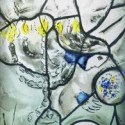
10.22.12 (Cheshvan 6, 5773) Just as we are to ask God for our daily bread (לֶחֶם חֻקֵּנוּ), so we ask him for our daily deliverance: "Lead us not into temptation, but deliver us from the evil one" (Matt 6:13). Note that the term translated "evil" in many translations ("deliver us from evil") is a substantive rather than an adjective: τοῦ πονηροῦ, the evil one... "Give us this day our daily deliverance from the evil one...."
The connection between our daily bread and deliverance is connected with our personal responsibility to choose between life and death, and therefore the Torah appeals to us bacharta ba'achayim (בַּחַרְתָּ בַּחַיִּים), to "choose life" -- and to always choose life -- even in moments we find difficult, distressing, and even when we might wish that we were no longer living... Choosing life means refusing to escape reality by evading the significance of our choices; it means finding the will to esteem life as worthy; it implies that we will eat our bread in trust that the Lord is at work even in the darkest of hours...
We live one day at a time; we only really have today. We are given daily bread for this hour of our need. Today is the day of your deliverance - if you are willing to walk in it. Therefore, the Spirit of the Living God cries out, "Choose life and live!"
הַעִידתִי בָכֶם הַיּוֹם אֶת־הַשָּׁמַיִם וְאֶת־הָאָרֶץ
הַחַיִּים וְהַמָּוֶת נָתַתִּי לְפָנֶיךָ הַבְּרָכָה וְהַקְּלָלָה
וּבָחַרְתָּ בַּחַיִּים לְמַעַן תִּחְיֶה אַתָּה וְזַרְעֶךָ
ha·i·do·ti ba·khem ha·yom et ha-sha·ma·yim v'et ha·a·retz
ha·cha·yim ve·ha·ma·vet na·tat·ti le·fa·ne·kha ha·be·ra·khah ve·ha·ke·la·lah
u·va·char·ta ba·cha·yim le·ma·an ti·che·yeh at·tah ve·zar·e·kha

"I call heaven and earth to witness against you today, that
I have set before you life and death, blessing and curse.
Therefore choose life, that you and your offspring may live"
(Deut. 30:19)

The Unity of the Name

[ The following entry is related to this week's Torah reading, parashat Lekh-Lekha.... ]
10.21.12 (Cheshvan 5, 5773) Regarding the promise to make Abraham's name "great" (Gen. 12:2), the sages note that the total number of Hebrew letters in the names of the patriarchs Abraham (אברהם), Isaac (יצחק), and Jacob (יעקב) is 13. Likewise the number of letters in the names of the matriarchs Sarah (שׁרה), Rebekah (רבקה), Leah (לאה), and Rachel (רחל) is 13. Furthermore 13 is the numeric value for the word echad (אחד), a word that means "unity" and that represents the 13 attributes of God's mercy (Exod. 34:6-7). The combined letters of the patriarchs and matriarchs therefore totals 26, the same value (in gematria) as that for the Name of God (יהוה), often translated as "LORD" in our bibles.
Parashat Lekh-Lekha

10.21.12 (Cheshvan 5, 5773) Last week's Torah portion (i.e., parashat Noach) showed how the LORD miraculously preserved Noah and his family from the cataclysmic judgment of the great flood. Just as there were ten generations from Adam to Noah, so there were also ten generations from Noah to Abram. And just as Noah became the father of 70 nations, so Abram would become the father of the Jewish people, through whom the Promised Seed - the Messiah and Savior of the world - would eventually come.
In this week's portion (Lekh-Lekha), Abram was 75 years old, married to (his half-sister) Sarai, and guardian of his nephew Lot (his deceased brother Haran's son) when he received the promise of divine inheritance and left Mesopotamia for the Promised Land: "And the LORD said to Abram, "Go from (i.e., lekh-lekha: לך־לך) your country and your kindred and your father's house to the land that I will show you. In Hebrew, the phrase lekh lekha means "go for yourself" (lit. "walk [הָלַךְ] for yourself [לְךָ]"), though the sages interpreted it to mean "go to yourself," that is, "look within yourself" in order to begin walking out your own journey into the promises. The realm of divine promise is only attained when we venture out in faith. Like our father Abraham, we likewise are called to leave everything behind and to go forth by faith to take hold of God's glorious promise for our lives...
 |
Inner Peace and Love...

10.19.12 (Cheshvan 3, 5773) The root of the word shalom (שָׁלוֹם) is shalem (שָׁלֵם), meaning whole, healed, and complete. Strife, then, comes from a lack of inner peace, and very often animosity toward others is really displaced self-hatred... We are commanded to love others as we love ourselves, but we can only give away to others what we have. When we have inner peace and are healed from fear, we are enabled to love others, because we are able to love ourselves. The LORD is the Prince of Peace (שַׂר־שָׁלוֹם), the One who makes peace for us and who loves us with an everlasting love:
וְאַהֲבַת עוֹלָם אֲהַבְתִּיךְ
עַל־כֵּן מְשַׁכְתִּיךְ חָסֶד
ve·a·ha·vat · o·lam · a·hav·tikh
al · ken · me·shakh·tikh · cha·sed

"I have loved you with an everlasting love;
therefore with lovingkindness have I drawn you."
(Jer. 31:3)

Shabbat Shalom, dear chaverim. Please keep this ministry in your prayers, including my physical health. Thank you so much. Peace, love, and blessing be yours in Yeshua...
Secure from the Flood...
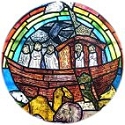
10.19.12 (Cheshvan 3, 5773) Yeshua asks, "Why do you call me 'Lord, Lord (אֲדנִי אֲדנִי)' and not do what I tell you? Everyone who comes to me and hears my words and does them, I will show you what he is like: he is like a man building a house, who dug deep and laid the foundation on the rock. And when a flood arose, the river burst against that house and could not shake it, because the house had been built well" (Luke 6:46-48).
The truth of Yeshua is known "existentially," that is, it is revealed in the way we live. We know the truth by doing the truth, not by reading about the truth in a book, no matter how holy or profound. We are given more light as we obey: "If you know these things, blessed are you if you do them" (John 13:17). In other words, the of faith is attested and made sure when we put into practice what we already know. As James the Righteous admonished: "Be sure you live out the message and do not merely listen to it and thereby deceive yourselves" (i.e., "reason around" the words of truth to evade their claim on your life).
Loving others is not optional, and that includes loving your enemies (Luke 6:27-31):
A tourist said to his guide, "You have a right to be proud of your town. I was especially impressed with the number of churches I saw in it. Surely the people here must love the Lord." "Well," said the cynical guide, "they may love the Lord, but they sure as hell hate each other." (Tony de Mello: Song Bird)
Note: The chief sin is to refuse the love of God revealed in Yeshua ... That is the deeper meaning of the "law," since Torah (תּוֹרָה) means "God's will," and the refusal to embrace God's love is to repudiate His will. "Whoever has the Son has the life; whoever does not have the Son does not have the life." "The person who does not honor the Son does not honor the Father who sent Him" (John 5:23) Torah observance apart from Yeshua means little, and it can even be an abomination if deems the cross of Messiah as unnecessary.... Only those who love Yeshua can even begin to follow the Living Torah of the LORD.
Healing the Divided Heart...

10.19.12 (Cheshvan 3, 5773) The problem for many of us is that we are neither wholly willing nor wholly unwilling. We are irresolute, indecisive, hesitant, and feckless... One the one hand we want to follow Messiah, on the other hand we discover inner resistance. Our inner dividedness comes from being undecided about who we really are: We both see and yet do not see our real motives. For instance, we may detect that we are proud or selfish, but we push this awareness out of mind in an act of willed ignorance. This creates "double-mindedness" since we both want to be humble and proud at the same time. The source of our problem, then, is the will, which serves as a gatekeeper of what we admit to ourselves, and the healing comes when we are honest before God and ask Him to be delivered from the sickness of our ambivalence.
King David understood the need for a unifying principle for his life: "One thing I ask of the Lord; that is what I will seek" (Psalm 27:4). David understood that walking in the truth required "uniting his heart," or "repairing the breach" within his inner affections so that he could experience wholeness, peace, and awe before the Divine Presence. King David knew that "right desire is the deepest form of prayer."
הוֹרֵנִי יְהוָה דַּרְכֶּךָ אֲהַלֵּךְ בַּאֲמִתֶּךָ
יַחֵד לְבָבִי לְיִרְאָה שְׁמֶךָ
ho·re·ni · Adonai · dar·ke·kha · a·ha·lekh · ba·a·mi·te·kha
ya·ched · le·va·vi · le·yir·ah · she·me·kha

"Teach me your way, O LORD, and I will walk in your truth;
unite my heart to fear your Name." (Psalm 86:11)

The divided heart is spiritually sick. A double-minded man is "two-souled" (δίψυχος) and unstable in all its ways (James 1:8). If "purity of heart is to will one thing," then impurity of heart is the result of simultaneously willing two things... It is therefore a state of inner contradiction, of having two separate "minds" or "wills" that hold contrary thoughts or desires. Yeshua said that "a divided house cannot stand." May it please the LORD our God to heal us of our ambivalence by making our hearts whole, resolute, steadfast, full of conviction, and entirely awake to the glory of His Presence at our right hand. Amen.
The Scandalous Cross...

10.19.12 (Cheshvan 3, 5773) The offence of the cross (τὸ σκάνδαλον τοῦ σταυροῦ) means, among other things, there is only one way to get right with God, that all paths do not lead to the same destination, and that what we believe really does matter. To deny the utterly unique claims of the Messiah is to be ashamed of Him and to negate the significance of the cross. And while we must affirm that the love of God is universal in its scope and application for all people, we must reject any kind of universalism that claims that people can get right with God apart from the cross of Yeshua.
I feel compelled to repeat this because I recently heard how a well-known Christian evangelist preaches a so-called "gospel" message that claims all people will be saved if they simply hunger for life, if they sincerely desire healing, etc., regardless of the content of their faith (i.e., the object of their trust). Now while this universalism may sound compassionate, it must be emphatically noted that such a "pragmatic approach" abandons the uniqueness of the message of Yeshua and betrays the message of the cross itself... Needless to say that is contrary to the clear teaching of the New Testament, where the Apostle Paul wrote, "For I determined to know nothing among you except Yeshua the Messiah, and Him crucified" (1 Cor. 2:2), and "May I never boast except in the cross of our Lord Yeshua the Messiah, through whom the world has been crucified to me, and I to the world" (Gal. 6:14). Indeed, Paul was so zealous of the unalloyed truth of the gospel that he warned: "If anyone is preaching to you a gospel contrary to the one you received, let him be accursed. For am I now seeking the approval of man, or of God? Or am I trying to please man? If I were still trying to please man, I would not be a servant of the Messiah" (Gal. 1:9-10).
If Yeshua is not really "the Way, the Truth, and the Life," the Bridge to the Father Himself (John 14:6), then he is either a lunatic or a charlatan, since he repeatedly taught that He exclusively had the power to judge humanity, to forgive sin, to bestow eternal life, and to exercise divine prerogatives. And if the cross of Yeshua does not make us right with God, there is no doctrine of "justification by faith," no idea of substitutionary atonement, no grace of God that forgives our sin, etc. Indeed all distinctive Christian doctrine gets so qualified and poeticized that it becomes little more than an inspiring story, on par with other inspiring stories told by various other religious traditions of the world... Contrary to unqualified universalism, however, it must be remembered that Christianity does not imply that God's attribute of compassion negates his attribute of justice, but rather that God's compassion overcomes His righteous judgment for our sin because of the cross of Yeshua. Therefore "there is salvation in no one else, for there is no other Name under heaven given among men by which we must be saved" (Acts 4:12). The Name of Yeshua is the Name above all other names (Phil. 2:9). The substitutionary atonement secured by Yeshua upon the cross is the only means by which we are eternally forgiven and cleansed by the LORD God. Yeshua alone is the Slayer of the serpent, the Healer of the wound of our mortality, and the One who "subjects all things under His feet." Salvation is not simply "epistemological," that is, something that is about faith, but it also "ontological," that is, something about the nature of reality. The new nature given to us by God is "really real," just as the cross of Yeshua really is the only way that people are made right with God.
Note: A lot more could be said on this topic, of course, and to read further, please see "Faith and Offense: The Scandal of Yeshua's Identity."
 |
Keeping Sane in an Insane World

[ The following entry is related to this week's Torah reading, parashat Noach.... ]
10.18.12 (Cheshvan 2, 5773) As it was in the Days of Noah, when the earth was "corrupt before God and was filled with violence," so we too are living in stressful times. The Apostle Paul wrote that the time before the "End of Days" would be "perilous" (χαλεπός) and full of human depravity (2 Tim. 3:1-5). In light of the raging spiritual war going on all around us, the following needs to be restated: "The important thing is not to lose your mind..."
The mind is the "gateway" to your heart, and it is therefore essential to guard your thinking by immersing yourself in the truth... Fear is often the result of believing the lie that God is not in control or is unable/unwilling to help you... "Not losing your mind" therefore means being grounded in what is real, and it therefore means understanding your identity and provision as a child of God. "God has not given us the spirit of fear, but of power (גְּבוּרָה / δύναμις) and of love (ἀγάπη), and of a "sound mind" (σωφρονισμός), lit. a "delivered" mind, "healed" from fragmentation (2 Tim. 1:7). The Greek word "sound mind" (σωφρονισμός) comes from the verb sodzo (σῴζω), meaning "to save," from saos (σάος) "safe," in the sense of being under restraining influence of the Spirit of God... The closest Hebrew word might be musar (מוּסָר), moral "discipline."
Part of the task of "guarding your mind" is being able to discern between good and evil. "The fear of the LORD is to hate evil (יִרְאַת יְהוָה שְׂנאת רָע); I hate arrogant pride and the evil way and perverse utterances" (Prov. 8:13). As Amos cried out, "Hate what is wrong, love what is right" (שִׂנְאוּ־רָע וְאֶהֱבוּ טוֹב). We are called to love the truth and abhor the lie. Tolerating sin in a world ripe for judgment is a tacit form of "collaboration" with the enemy... Indeed, the only thing regarded as intolerable in the devil's world is the objection that people have a supposed "liberty" to sin. But the LORD is clear on this point: "Those who call evil good and good evil are as good as dead, who turn darkness into light and light into darkness, who turn bitter into sweet and sweet into bitter. Those who think they are wise in their own sight are as good as dead, those who think they possess understanding" (Isa. 5:20-21).
In light of the ongoing depravity of this evil world, it is essential to remember that God is in complete control of all things. He works "all things together for good" to those who are trusting in Him. And "there is no fear in love" (אין פַּחַד בָּאַהֲבָה), especially since we know that ein od milvado (אֵין עוֹד מִלְבַדּו) -- there is no real power apart from the LORD (i.e., He is the only true Power in the universe, despite the menace and threats that mankind routinely inflict upon one another). Indeed, our King the Messiah Yeshua is called Elyon lemalkhei-aretz (עֶלְיוֹן לְמַלְכֵי־אָרֶץ) - the "Ruler of the princes of the earth" (Rev. 1:5) - and that means they ultimately will answer to Him. Despite the schemes of this world and its princes, we know that the LORD God Almighty reigns, and therefore we need not be afraid of man or his devices. The call to holiness is a call to act counterculturally -- to call upon the Name of the LORD and to walk steadfast in faith. Be strong, chaverim!
 |
Seeing the Invisible Things...

[ The following entry concerns this week's Torah reading, parashat Noach. Please read the Torah portion to "find your place" here... ]
10.18.12 (Cheshvan 2, 5773) Just as Noah foresaw the great cataclysm to come, so we understand that the world above our heads and under our feet is destined to destruction, as we likewise await the promised world to come: "Lift up your eyes to the heavens, and look at the earth beneath; for the heavens vanish like smoke, the earth will wear out like a garment, and they who dwell in it will die in like manner; but my salvation will be forever, and my righteousness will never be dismayed" (Isa. 51:6).
This idea is repeated in the New Testament: "For as were the days of Noah, so will be the coming of the Son of Man" (Matt. 24:37). "But the Day of the LORD will come like a thief, and then the heavens will pass away with a roar, and the heavenly bodies will be burned up and dissolved, and the earth and the works that are done on it will be exposed. Since all these things are thus to be dissolved, what sort of people ought you to be in lives of holiness and godliness, waiting for and hastening the coming of the Day of God, because of which the heavens will be set on fire and dissolved, and the heavenly bodies will melt as they burn? But according to his promise we are waiting for new heavens and a new earth in which righteousness dwells. Therefore, beloved, since you are waiting for these, be diligent to be found by him without spot or blemish and at peace" (2 Pet. 3:10-14).
In light of all this, we look not to the things that are seen but to the things that are unseen. "For the things that are seen are transient, but the things that are unseen are eternal... For the invisible things of Him from the creation of the world are clearly seen, being understood by the things that are made, even his eternal power and Godhead. Therefore we are strangers and exiles on the earth, looking forward to the city that has foundations, whose designer and builder is God" (2 Cor. 4:18; Rom. 1:20; Heb. 11:10,13).
Faith sees the invisible... Our father Abraham was promised descendents as numerous as the stars in the sky or sand on the seashore, despite the fact that he was an old man and his wife had long past the age of bearing children. Abraham believed in the One who gives life to the dead and calls into existence the things that do not exist: "He staggered not at the promise of God through unbelief but was strong in faith, giving glory to God; and being fully persuaded that, what He had promised, He was able also to perform: And therefore it was imputed to him for righteousness" (Rom. 4:19-22).
 |
The Friend of Sinners...

10.18.12 (Cheshvan 2, 5773) "The Son of Man came ... and they say, 'Look at him! A glutton and a drunkard, a friend of tax collectors and sinners!'" (Matt. 11:19). People, especially the religious people, were scandalized by Yeshua because he was a "friend of tax collectors and sinners!" Yet what sickness of heart is this, to despise those who are sick? Invariably formal religion creates an "in-group" that attains its status at the expense of the "outsider," the "stranger," the "sinner," and so on...
The religious leaders of Yeshua's day were offended because he "welcomed sinners" and enjoyed eating meals with them (Luke 15:2). We can almost hear their disapproving whispers and their dismissive accusations: "How could a good Jew behave like this? Does he not understand the call to personal holiness? Does he not know the Torah of "clean" and "unclean"? If a man is known by the company he keeps, we know enough about Yeshua to know that he's not truly pious..." And to this very day the self-righteous find offensive the idea that God welcomes the sinful, the needy, the broken, the despised, and the "outsider" into His presence... As Yeshua said, "those who are well have no need of a physician," and indeed offering them God's cure will always be regarded as a kind of poison...
We greatly rejoice that God indeed is the friend of sinners; He is the Good Shepherd who seeks and saves the lost. Thank the Lord that he comes not for the "righteous" but for those who are brokenhearted, for those mortally wounded by their own sin... Any so-called theology or religion that repudiates or minimizes God's love for the sinful, the needy, the broken, is little more than a shrine to human pride and vanity... On the contrary: the heart of the Compassionate One always welcomes a sinner who sincerely turns to Him.
 |
Herald of Righteousness...

[ The following entry concerns this week's Torah reading, parashat Noach. Please read the Torah portion to "find your place" here... ]
10.17.12 (Cheshvan 1, 5773) It is astounding to consider that Abraham personally knew the patriarch Noah (Abraham was 58 years old when Noah died), and undoubtedly Noah told him of his father Lamech, who had seen and spoken with Adam, the very first man created by God alone. Later, Abraham's son Isaac knew Shem, Noah's firstborn son, the first high priest of Salem who preserved the message of teshuvah (repentance) and retained the original promise of the coming Redeemer given by God. For this reason the New Testament calls Noah a "herald of righteousness" (2 Pet. 2:5).
 |
It is said that the righteous have three qualities. First, they are kind and just - "tzaddik" (צדִּיק); second, they are wholehearted and loyal – "tamim" (תָּמִים); and third, they "walk with God," accepting the yoke of heaven and not questioning God's actions. Noah had all three of these qualities, as it says, "Noah was a righteous man (ish tzaddik), blameless (tamim) in his generation: Noah walked with God."
אֵלֶּה תּוֹלְדת נחַ
נחַ אִישׁ צַדִּיק תָּמִים הָיָה בְּדרתָיו
אֶת־הָאֱלהִים הִתְהַלֶּךְ־נחַ
el·leh · to·le·dot · No·ach
No·ach · ish · tzad·dik · ta·mim · ha·yah · be·do·ro·tav
et · ha·E·lo·him · hit·ha·lekh · No·ach

"These are the generations of Noah.
Noah was a righteous man, blameless in his generation.
Noah walked with God."
(Gen. 6:9)
 |
Noah's righteousness is all the more remarkable because he lived in the midst of an entirely depraved and heartless culture. The "Days of Noah" (יְמֵי־נחַ) were marked by "lawlessness" (anomie), moral anarchy, violence, corruption, and complete disregard of the transcendental truth of God. "The LORD saw that the wickedness of man was great in the earth, and that every intention of the thoughts of his heart was only evil continually. And the LORD regretted that he had made man on the earth, and it grieved him to his heart" (Gen. 6:5-6). Because people denied moral reality and regarded God as unconcerned with their behavior, the LORD brought the flood to prove that He repays both the righteous and the wicked.
Yeshua warned that as it was in the days of Noah, so it would be during the time of his second coming (Matt. 24:38-39). Regarding the character of souls living during the End of Days, the Apostle Paul foresaw that "people will be lovers of self, lovers of money, proud, arrogant, abusive, disobedient to their parents, ungrateful, unholy, heartless, unappeasable, slanderous, without self-control, brutal, not loving good, treacherous, reckless, swollen with conceit, lovers of pleasure rather than lovers of God, having the appearance of godliness, but denying its power" (1 Tim 3:1-4). The Apostle Peter calls them "scoffers who walk after their own evil inner urges (1 Pet. 3:3). Note also that "pharmakeia" (φαρμακεία), or drug abuse, will also be rampant (Gal. 5:19; Rev. 9:21, 18:23).
Note: For more on this subject, see "The Days of Noah."
 |
Conversation of Heart...

10.16.12 (Tishri 30, 5773) The prelude to the central daily prayer of Judaism (i.e., the Amidah) begins with King David's great appeal: "O Lord, open my lips and my mouth will declare Your praise" (Psalm 51:15). David's declaration of thanks comes from trusting in God's love and forgiveness, just as we ask also trust God to pray within us, so to speak, and to utter groanings and words that come from his own heart to ours that return again unto his. We pray to the LORD as the LORD knows Himself to be - not as we imagine Him to be - since His love and passion is the beginning and end of all true prayer. This is the deeper "conversation of heart," the secret murmur spoken between lovers, the cooing and song of holy romance... The Ruach HaKodesh (רוּחַ הַקּדֶשׁ), the Holy Spirit, "helps us in our lack of strength. For we do not know what to pray for as we ought, but the Spirit himself intercedes for us with groanings too deep for words" (Rom. 8:26).
אֲדנָי שְׂפָתַי תִּפְתָּח
וּפִי יַגִּיד תְּהִלָּתֶך
A·do·nai · se·fa·tai · tif·tach
u·fi · yag·gid · te·hi·la·te·kha

"O Lord, open my lips,
and my mouth will declare your praise."
(Psalm 51:15)
Living for Eternity...
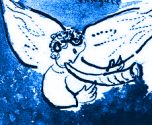
10.16.12 (Tishri 30, 5773) Many of us are obsessed with avoiding sickness, prolonging our mortal lives, enhancing personal happiness, and so on. Perhaps we forget that the fulfillment of all our hope and desire is found in the Divine Presence, with God in heaven. Paul said, "I am caught in this dilemma: I want to be gone and with the Messiah, and this is by far the stronger desire, yet for your sake to stay alive in this body is the more urgent need" (Phil. 1:21-24). Presently we are "in but not of" this world, and that means we must live the daily paradox of dying to this life; of letting go to receive; of abiding in the present age as a stranger to be at home with God in eternity...
Plutarch tells the story of how Alexander the Great came upon the wandering philosopher Diogenes looking attentively at a heap of human bones. "What are you looking for?" asked king Alexander. "Something I cannot find," said the philosopher. "And what is that?" "The difference between your father's bones and those of his slaves." (Quote from Tony de Mello)
Sin and Despondency...

10.16.12 (Tishri 30, 5773) "Whoever battles with monsters had better see to it that it does not turn him into a monster" (Nietzsche). A God-fearing man once complained to a sage that he was tormented by evil desire and had become despondent over it. The sage listened intently and then said, "Guard yourself from such despondency above all else, for it is worse than sin. When the yetzer [evil impulse] awakens desire in us, it is not concerned with plunging us into sin, but with plunging us into despair by way of our sinning."
We recall the words of James the Righteous: "Each person is tempted when he is lured and enticed by his own desire. Then when desire has conceived, it gives birth to sin; and sin when it is fully grown brings forth death. Do not be deceived..." (James 1:14-16). In other words, sin begins with selfish desire, but the "fruit" or "end" of sin is death, understood as separation from life, healing, love, peace, and so on. Sin "crouches" at the door; its desire is for you, but you must master it (Gen. 4:7).
How we choose to think inevitably leads to decisions and actions... In our warfare against the yetzer and the devil, we must be sure to rely upon God's love and grace, lest we find ourselves fighting "evil with evil," thereby amusing the powers of darkness... Tzedek tzedek tirdorf (צֶדֶק צֶדֶק תִּרְדּף) means that we must pursue righteousness righteously. Some people seem to be so afraid that sin and evil will overtake them that they quite forget to exercise caution that they resist sin and evil in sinful ways... May God help us to see our sin and our battle against evil only in the light of His glorious Presence.
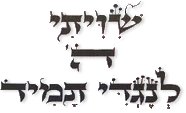 |
Note: The quote (above) comes from Frederick Nietzsche, who was the son of a Lutheran minister (named Carl), but who later fell away from God and went literally insane... I am not endorsing Nietzsche's (anti)theology, of course, though his point that people can become "monsters" over a "cause" is a valid one. Indeed there are entire religions based on the idea that whoever disagrees with their theology ought to be killed... Advocates of such a religion can become monsters for the sake of their religion....
Gluttony and Abstinence
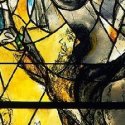
10.16.12 (Tishri 30, 5773) We tend to regard "gluttony" as overindulgence in food or drink, but it can also be regarded as any preoccupation that leads to excess. Hence we can become "theologically obese," we can "binge" on religious self-righteousness; we can feed on resentment and be consumed by inner anger; we can bask in apathy, relish greed, lust for the approval of others, wallow in self-pity, obsess over our health, and so on. Similarly, we tend to regard "abstinence" as refraining from feeding our appetites, though it can also be regarded as withholding what we need, denying ourselves tolerance, refusing to forgive ourselves, living under the slavery of perfectionism, legalism, and so on... "We fall not because we are weak, but because we believe ourselves strong."
Pearl of Great Price...
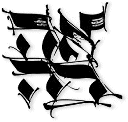
10.15.12 (Tishri 29, 5773) Yeshua said, "The kingdom of heaven is like a merchant in search of fine pearls, who, on finding one pearl of great value, went and sold all that he had and bought it" (Matt. 13:45-46). You may be tempted to identify with the merchant and regard this parable as a challenge for you to give up everything to obtain the surpassing worth of the kingdom of heaven, but another way to understand it is to see God as the merchant, the central character of the story.... Instead of you paying the great price for the pearl, turn the story around: God paid the price - and you are regarded as His choice pearl! You are a treasured possession, the "apple of God's eye..."
Sharing the Burden...
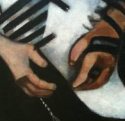
10.15.12 (Tishri 29, 5773) An old pious man once saw a beautifully shaped rock that he very much wanted to bring as a gift to the Holy Temple in Jerusalem. However, the rock was too heavy for him to carry and he couldn't afford to pay any porters to bring it up to the Temple. The man prayed and asked God for help, and soon five angels (disguised as men) appeared to offer the man assistance. The man told them that he would like them to carry the stone to Jerusalem, but he couldn't pay them. The five angels immediately offered to carry the rock on his behalf, but only if the man put his finger to the rock as they carried it. The midrash states that although the angels didn't need his help, the man was required to do what he could - and then God then took care of the rest...
This story, apocryphal though it may be, teaches the truth that we must "reach out and touch" the mountain as we trust the LORD to move it for us (Matt. 21:21). This is not unlike the story of the woman who had the "issue of blood" that could not find healing through a mortal doctor (Mark 5: 25-34; Luke 8:43-48). She thought that if she only could reach out and touch Yeshua's tzitzit, she would be healed... And so she was.
 |
The Now Covenant...

10.15.12 (Tishri 29, 5773) Yeshua often taught using stories, parables, metaphors, and so on. He rarely "gave the answer" to a direct question, but instead provoked dialog, discussion, deep thinking, etc. Yeshua did this, I believe, to rebuff mere triflers but also to expose what was really going on within the heart... Good teachers understand that the indirect method is often the best for making their point, since that enables the hearer to "own" the message for themselves. Storytelling is part of the tradition of Yeshua. Applied to idea of Scripture, this means that we should be careful not to make an "idol" out of the Bible or to demand absolute certainty when there is none. Of course the Bible is God's Word and is the truth, but what matters is how we respond to the words of the Bible; after all, the Bible points to the Reality, the Living Word of Power that sustains all things right here, right now... We talk a lot about the "old" covenant and the "new" covenant, but what about the "now" covenant? The real question is the heart's motive and secret desires -- right now.
People necessarily value things, and therefore every person alive is a "worshiper" (i.e., a person who finds "worth" in something or other). The question that matters is what is your ultimate concern? What moves you to get out of bed in the morning, to go through your day, to have hope in your heart? What do you really want? Where are you really going? What burden are you willing to ask God to help you lift, and why?
 |
Parashat Noach (פרשת נח)

[ Tomorrow evening marks Rosh Chodesh Cheshvan, the start of the second month of the new Jewish civil year. Look for the new moon later this week! And may it please the LORD to renew for us great grace and peace for this coming month, chaverim. ]
10.14.12 (Tishri 28, 5773) In last week's Torah portion (Bereshit), we read about the disheartening history of earliest humanity. After just ten generations, from Adam to Noah, the LORD had grown so weary of humanity that he "regretted" (yinchem, יִּנָּחֶם) creating man in the first place and "his heart was saddened" (Gen. 6:6). It is interesting to note that the word translated "regretted" comes from the root nacham (נָחַם) -- the same root for the name "Noach" (נחַ) himself. Other Hebrew words that use this root include nichum (compassion), nu'ach (rest), nacham (repent/console), and menuchah (rest from work). Though God "regretted" (נָחַם) that He had made mankind (Gen. 6:7), He comforted himself by finding a means to comfort lost humanity...
Noach's father Lamech (לֶמֶךְ, "powerful one") regarded his son as a deliverer who would comfort humanity from the ravages of the curse (Gen. 5:29). Noach would give relief (i.e., rest) from the toil and vexation of life. Indeed, Noach was a "type" of savior who would rebirth the world by giving lasting comfort and rest (for more about this, see the page "Noah and Jesus"). In like manner it was prophesied that Yeshua would give us everlasting rest: "His rest shall be glorious" (Isa. 11:10), just as He offers rest to the weary (Matt. 11:28, Heb. 4:9). His sacrifice on the Cross at Moriah undoes the kelalah (curse of work) over the children of Adam. Indeed, His life, sacrifice, and resurrection was like a "magic spell" that "spoke backwards" the sin of the "First Adam" - and by means of His deliverance the power of the curse was forever broken (Gal. 3:13, John 3:14, 2 Tim.1:10; Heb. 2:14; Heb. 9:27-28; 1 John 3:8, Rev. 22:3). Yeshua is Adam ha-Sheni - the "Second Adam" - the promised Son of Man. By means of His Spirit we are given an everlasting comfort (John 14:16).
Eschatologically, the "days of Noah" are a picture of the idolatrous conditions of the world that will prevail just before the calling up of the followers of Yeshua before the time of Great Tribulation upon the earth: "As were the days of Noah, so will be the coming of the Son of Man" (Matt. 24:37). The generation of the Flood was said to be "filled with violence" (Gen. 6:13) caused by ignorance -- literally the "state of ignoring" moral and spiritual truth. Because people willingly disregarded God from their midst, they arrogated to themselves divine prerogatives: "every man did what was right in his own eyes." The resulting moral corruption and anarchy led to divine and catastrophic judgment: when God destroyed them with water, they return the world to its original state of tohu vavohu v'choshekh: "confusion and emptiness and darkness" (Gen. 1:2). This is our world today.
The seven day warning given to Noah suggests the seven year tribulation period to come (Daniel's 70th week), and also the "rapture" of the people of God who will be carried above the prophesied worldwide cataclysm. Just as God protected Israel during the time of judgment upon Egypt, so He will protect His people from the wrath of the "great Day of the LORD." But please note that "the LORD shut him in" (Gen. 7:16). Noah's teivah (ark) had God Himself as its designer (Gen. 6:15f), just as salvation in Messiah is by God's design (Jonah 2:9; Eph. 1:9, 1:11). It contained only one door (Gen. 6:16), just as Yeshua is the only door to salvation (John 10:9; 14:6). Noah's ark contained three levels (Gen. 6:16) and salvation has three own experiential levels (2 Cor. 1:10): past, present, and future. In the past (at Moriah) Yeshua delivered us from the penalty of sin; in the present, He is delivering us from the power of sin; and in the future He will deliver us from the very presence of sin. Baruch Hashem - may that day come soon!

Postscript: After the flood waters began to subside, Noah first sent out a raven, but it vainly circled the ark. He waited seven more days and sent out a dove instead. The Talmud states that doves represent peace because they mate for life and glide gently through the air; they also have a peaceful "cooing" sound and are non-raptorial, feeding on seeds and fruits. Doves are also kosher and the only bird species that could be offered upon the altar for sacrifice. After the second attempt, the dove returned with an olive tree branch in its beak, anticipating both the holy olive oil that was used to fuel the menorah and also the oil used to anoint the High Priest and kings of Israel... Miriam, the mother of Yeshua offered a pair of turtledoves, and the Holy Spirit descended upon Yeshua in the form of a dove.
A Covenant of Fire...

[ Parashat Bereshit is always read on the Sabbath following Simchat Torah, and therefore is the very first portion in the annual Jewish cycle of Torah reading... ]
10.12.12 (Tishri 26, 5773) The Scriptures reveal that words created the universe -- or rather, the Word of God did (בְּרֵאשִׁית הָיָה הַדָּבָר). When the Divine Voice (i.e., the Word of God) spoke cosmic Light into existence (Gen. 1:3), God was not creating the physical light of the Sun or the Moon, since the heavenly bodies were created later (Gen. 1:14). This supernal light was the first expression of God's handiwork outside of Himself, His first revelation of contingent existence (i.e., existence that owes its source, continuance, and end to God's transcendent power and will). The Divine Light formed the canvass, if you will, of God's portraiture of creation (in three-dimensional terms, the Divine Light formed a sort of "container" that became the "house" or "place" of Creation). Among other things, this means that ultimate reality is grounded in the Source of Light, Love, and Truth -- regardless of how dark the present hour may appear. God's Name YHVH means He is always present, and therefore we call upon Him in our time of need (Heb. 4:16).
Note: For more on this subject, see "Covenant of Fire."
 |
Olam Malei - An Entire World...

[ The following entry concerns this week's Torah reading, parashat Bereshit. Please read the Torah portion to "find your place" here... ]
10.11.12 (Tishri 25, 5773) God made you entirely unique, and no one else was created for the special role that you have in the overarching plan of Almighty God... Jewish tradition says that God created Adam alone as "olam malei" (עוֹלָם מָלֵא), "an entire world," to teach that each individual is of great value and significance. "Thus anyone who sustains one individual has sustained the world; and anyone who destroys one individual has destroyed an entire world" (Sanhedrin 37a). In addition, God created man as a solitary creation to remind all people that they descend from a common source: No one has a greater or better lineage than anyone else. Moreover, each of us is created with a radical sense of "aloneness," a built in "hunger" for relationship and especially for God's presence. Therefore the very first commandment to Adam and Eve comes in the form of a blessing: "And God blessed them and said, פְּרוּ וּרְבוּ / pru urvu: "be fruitful and multiply" (Gen. 1:28). People were created to be in fellowship with others and with God, and when this is lacking, there is a profound soul hunger and need....
 |
Mirroring of the Heart...
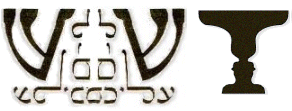
[ The following entry concerns this week's Torah reading, parashat Bereshit. Please read the Torah portion to "find your place" here... ]
10.11.12 (Tishri 25, 5773) The creation of Eve is sometimes translated as a "helper fit for him [Adam]," though the Hebrew term ezer kenegdo (עֵזֶר כְּנֶגְדּוֹ) literally means "a helper against him." This unusual phrase is interpreted by Rashi to mean that the relationship between Adam and Eve would imply a choice: Either Eve would be a help or an antagonist based on Adam's merit. If the relationship is based on trust, then Eve would be ezer (help), but if it not, she would oppose him. In other words, Eve would mirror Adam's heart middah keneged middah, in a "like-for-like" manner... The sages note that the Hebrew word for man (i.e., ish: אִישׁ) and the word for woman (i.e., ishah: אִשָּׁה) share the same root word (אֵשׁ), meaning "fire." The two words differ by just two letters - a Yod and a Hey (יה) - which together form one of the Divine Names (Yah). If God is present between them, then they will be rightly related as man and woman, but if God is not present (symbolized by the absence of the Yod and Hey, respectively), there will only be left a destructive fire (אֵשׁ).
 |
Signature of God...

[ The following entry concerns this week's Torah reading, parashat Bereshit. Please read the Torah portion to "find your place" here... ]
10.11.12 (Tishri 25, 5773) The midrash teaches that the phrase, "the beginning [i.e., "head"] of your word is truth" (Psalm 119:160) applies to the first sentence of the Torah, namely, "In the beginning God created the heavens and the earth" (Gen. 1:1), since the word "beginning" (i.e., bereshit: בְּרֵאשִׁית) literally means "at the head [i.e., rosh: ראשׁ] of," referring to God's creative power. In the Hebrew text we note that the last letters of the words bara Elohim et (בָּרָא אֱלהִים אֵת), in Gen. 1:1, spell the word "truth" (i.e., emet: אֱמֶת), as do the last letters of the words that summarize the account of the creation given later: bara Elohim la'asot (בָּרָא אֱלהִים לַעֲשׂוֹת), in Gen. 2:3. This is why the sages sometimes say the "signature" or "seal" of God is truth, as if God Himself "signed the account" of the creation of the universe using His own hand...
ראשׁ־דְּבָרְךָ אֱמֶת
וּלְעוֹלָם כָּל־מִשְׁפַּט צִדְקֶךָ
rosh · de·va·re·kha · e·met
u·le·o·lam · kol · mish·pat · tzid·ke·kha

"The beginning of your word is truth,
and every one of your righteous rules endures forever"
(Psalm 119:160)
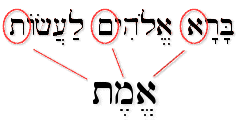 |
The idea that God created the universe "to do" (לַעֲשׂוֹת) His will has been interpreted to mean that it is our responsibility, as God's creatures made in His image, to participate in the "doing" of His work. "Never say, 'What does all this have to do with me? as if you were not a part of creation." Yeshua is the Word of God, the Truth of God, the Way of God, the Life of God, and the One who breathes out nishmat chayim, the "breath of your life." Therefore we follow Him by sharing the message of God's redemptive love for the world.
Note: The Lekhivitzer Rebbe said, "The Torah begins with the word 'bereshit' (בְּרֵאשִׁית), which can be understood to say 'God created the world for the sake of the beginning.' All the Creator asks is that you make a beginning, that you turn in the right direction." Indeed, we never really get past the first steps made in earnestness toward God. In that sense we are "always beginning," since we are never beyond the first need of the heart to turn to God. We are all incomplete, awaiting the end for which we were created, and therefore we are always calling on the LORD, always abiding in Him, always seeking His face...
 |
Curse on the Nachash...
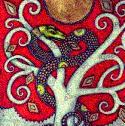
[ The following entry concerns this week's Torah reading, parashat Bereshit. Please read the Torah portion to "find your place" here... ]
10.11.12 (Tishri 25, 5773) The punishment of the nachash (נָחָשׁ), or "snake," was that it would "eat dust [עָפָר תּאכַל] all the days of its life" (Gen. 3:14). But what sort of curse is this - that food would be plentiful, that it would never go hungry? And yet having food placed "on your belly" is indeed a great curse, since it means never having to depend on God for your daily bread... Indeed, there is no worse fate than to be sated by this world, to have no sense of need, to be inwardly "rich," to be "on your belly" and full of yourself... Blessed are the poor in spirit; blessed are those who know their own inner poverty, weakness, and need for support. Praise God for our deficiencies, our hunger, our thirst, because through them we learn to rely on God alone for life!
Spiritual danger is just as real as physical danger, though most people pretend it isn't because it isn't easily seen. The real dangers of life are not vulnerability to crime or some accident, however, but rather susceptibility to despair, the tendency to put off repentance, and the possibility of not dying well.... It is a great danger to walk through life asleep only to be jolted awake upon the day of death. "The greatest danger is that one does not discover, that one is not always discovering, that one is in danger" (Kierkegaard). Danger of what? Of wasting your life with trifles and vanities; of never learning how to truly love or to be loved; of becoming numb, unfeeling, and therefore unmoved by your need for God. As C.S. Lewis once wrote, "The safest road to hell is the gradual one - the gentle slope, soft underfoot, without sudden turnings, without milestones, without signposts."
 |
Alphabet and Creation...
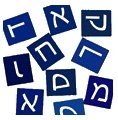
[ The following entry concerns this week's Torah reading, parashat Bereshit. Please read the Torah portion to "find your place" here... ]
10.11.12 (Tishri 25, 5773) The Torah begins with the letter Bet (בּ) rather than the letter Aleph (א) to denote God's humility. The letter Aleph is the first letter, the king of the alphabet, and the letter that begins "I AM" (i.e., אנכי) - the first word of the Ten Commandments. The letter Bet, on the other hand, is the second letter that means "house" or "home" (בּית). This suggests that the Torah begins with the focus not on the "I" but on creation, the household of God. And though God did not wish to be the center of attention, so to speak, Aleph and Bet together spell the word "father" (אב), that is, the One who oversees the household of the world in love. As it is written, "Every good gift and every perfect gift is from above, coming down from the Father of lights (אֲבִי הַמְּארוֹת) with whom there is no variation or shadow due to change" (James 1:17).
Note: It may be wondered why we would say that God is humble... Well, it is certainly true that the LORD is self-effacing, self-forgetting, utterly unselfish, absolutely noble of heart, and so on. Moreover we are commanded to emulate God, who is merciful, gracious, slow to anger, abounding in steadfast love, etc. (Exod. 34:6-7). Most of all we are to follow the example of Yeshua, YHVH in the flesh, who willingly emptied Himself and took the role of a humble servant (Phil. 2:6-7). Yeshua himself said, "Take my yoke upon you, and learn from me, for I am gentle and lowly in heart, and you will find rest for your souls" (Matt. 11:29).
 |
Creation for the Messiah...
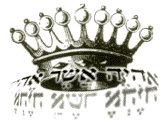
10.10.12 (Tishri 24, 5773) The Talmud says "All the world was created for the Messiah" (Sanhedrin 98b). The New Testament had earlier said the same thing: "All things were created by Him (i.e., Yeshua), and for Him" and in Him all things consist (συνεστηκεν, lit. "stick together") (Col. 1:16-17). The first word uttered by God, "Let there be light" (Gen. 1:3), was uttered on behalf of all who would behold His glory, as it is written, "Arise, shine forth, for your light has come" (Isa. 60:1). When Adam first opened his eyes and human consciousness was born, he immediately understood that the LORD created all things, including himself. According to midrash, Adam's first words were, יהוה מֶלֶךְ עוֹלָם וָעֶד / Adonai malakh olam va'ed: "The LORD is King for ever and ever." God then said, "Now the whole world will know that I am King," and He was very pleased. This was the "tov me'od" (טוֹב מְאד) moment of creation, when God saw all that He had made "and found it very good" (Gen. 1:31). Therefore the name for man (i.e., adam: אָדָם) is connected with the word for "very" (i.e., me'od: מְאד): the birthday of humanity is therefore the Coronation Day for the King of the Universe.
The implication that God is our Creator is enormous and pervades everything else in our lives. God's creative power is witnessed by all conscious life. The Divine Light that was created before the sun and the stars represents God's immanent presence that "lights up" all of creation - including our minds (Gen. 1:3). Since we were created b'tzelem Elohim, "in the image of God," the witness of God's truth is foundational to all of our thinking as well. The revelation (not the invention) of logical first principles is part of God's "signature," if you will, of how the mind is wired to reality. Likewise we have intuitive awareness regarding the existence of moral truth (i.e., the standard of justice and moral law), aesthetic truth (i.e., ideals of beauty, goodness, worth, and love), and metaphysical truth (i.e., cause and effect relationships). "The heavens are recounting the glory of God, and the expanse is proclaiming his handiwork" (Psalm 19:1). God's power and presence can be clearly inferred from the tremendous effect of the universe itself. As Paul stated, "the invisible things of Him (τά ἀόρατα αὐτοῦ) from the creation of the world are clearly seen (καθοράω), so that people are without excuse" (Rom. 1:19-20). It is the fear of the LORD (יִרְאַת יהוה) that is truly the beginning of wisdom and knowledge (Psalm 111:10; Prov. 1:7; 9:10). The Hebrew word for fearing (ירא) and seeing (ראה) share the same root. We cannot truly see reality apart from reverencing God as the Lord and King of Creation.
Note: For more on this, see "High Holidays and the Gospel."
 |
Creation and Design...

[ Parashat Bereshit is always read on the Sabbath following Simchat Torah, and therefore is the very first portion in the annual Jewish cycle of Torah reading... ]
10.10.12 (Tishri 24, 5773) If you were walking through the woods one day and suddenly found an exquisitely crafted pocket watch lying on the ground, you wouldn't think it had magically "just appeared out of thin air," with no cause or explanation for its presence, much less would you think that the watch was produced by random forces operating in an entirely material universe. On the contrary, as you look closely at the watch and observe its intricacies of design, you marvel over the precisely machined, interlocking gears, calibrated springs, and a beautifully fashioned faceplate that marks motion in meticulous increments. And so it is, with our experience of creation and its complexities and wonders. The existence of a world in all its intricate detail forces a thinking person to recognize the Divine Presence that brought all things into being and sustains them for a greater end. Thus the Kol Dodi rearranges the letters of the word bara (בָּרָא), "to create," to form ba'er (בַּאֵר), "to clarify," since creation clarifies the role of the design and glory of the Creator: "In the beginning, God clarified the heavens and the earth" (Gen. 1:1).
 |
Irrepressible Creation...

[ Parashat Bereshit is always read on the Sabbath following Simchat Torah, and therefore is the very first portion in the annual Jewish cycle of Torah reading... ]
10.10.12 (Tishri 24, 5773) The cosmological dogma that the universe somehow was caused by an enormous (and yet inexplicable) explosion several billions of years ago (i.e., the "big bang") is routinely accepted by people today, though such a theory cannot explain what caused the big bang itself, nor can never explain why is there something rather than nothing at all... Moreover, whereas scientific cosmology "omnisciently" claims that the universe came into existence without a discernible reason, that is, groundlessly or without rational warrant, it is somehow considered "irrational" to believe that a personal and holy God created the world for the sake of revealing his love and glory to mankind. In light of this, it is helpful to remember that genuine science involves observation and measurement, and whenever cosmologists extrapolate beyond empirical evidence to explain the origin of the universe, they are creating a myth or a model that is every bit as religious as those who believe God created the universe yesh me'ayin, "out of nothing."
הַשָּׁמַיִם מְסַפְּרִים כְּבוֹד־אֵל
וּמַעֲשֵׂה יָדָיו מַגִּיד הָרָקִיעַ
יוֹם לְיוֹם יַבִּיעַ אמֶר
וְלַיְלָה לְּלַיְלָה יְחַוֶּה־דָּעַת
ha-sha·ma·yim · me·sa·pe·rim · ke·vod · El,
u·ma·a·seh · ya·dav · mag·gid · ha·ra·ki·a;
yom · le·yom · ya·bi·a · o·mer,
ve·lai·la · le·lai·la · ye·cha·veh · da·at

"The heavens recount the glory of God,
and the sky above proclaims the work of His hands.
Day after day it speaks out;
night after night it reveals His greatness."
(Psalm 19:1-2)

Download Study Card
Even logic reveals that the universe had a beginning, since it is impossible to traverse an infinite number of moments to arrive at a present moment... Since the universe is indeed present, therefore it necessarily had a beginning. The question of the origin of the universe therefore leads to "inference to the best explanation." On the assumption that the Torah is true, what would we expect to see in light of human history and its values, of good and evil, of love, beauty and truth, and so on... The objections raised to a personal Creator and King are moral more than they are intellectual. It is a matter of the will, not of the evidence itself. There is plenty of "junk science" in the world today that purports to substantiate godlessness. The LORD is revealed intuitively within each human soul, and the impression of the Divine nature is indelibly written on the human heart. As it is written, "God's eternal power and divine nature from the creation of the world are understood through what has been made, so people are without excuse" (Rom 1:20).
If the devil can't kill you, he will try to make you insane... He will lie to you about who you really are... He he will attempt harass you and vex your soul. He will whisper fearful things in your ear... He will make what is small seem big and what is big seem small. He will raise dark suspicion within your soul, causing you to walk in mistrust. He will remind you of your sins to make you feel ashamed and dirty. He will hiss that you are unlovable and unworthy. He will argue on behalf of your flesh that you deserve better than this... He will tempt you to seek relief in cisterns of emptiness and futility. Most of all, he will try to cast a spell to make you forget that you are truly a prince or princess of God Almighty... The devil seeks to drive you into the exile of loneliness and despair. Rebuke him in the Name of the LORD!
Note: For more on this, see the article, "Irrepressible Creation."
 |
The Seedbed of Creation...

[ Parashat Bereshit is always read on the Sabbath following Simchat Torah, and therefore is the very first portion in the annual Jewish cycle of Torah reading... ]
10.10.12 (Tishri 24, 5773) The Book of Genesis (בְּרֵאשִׁית) is truly the "beginning," the "root," and the "seedbed" of all the subsequent Scriptures - including the message of the gospel and the revelation of the New Testament. In Genesis we see the creation and ruin of man through sin, but we take hold of the promise of deliverance through the coming Seed of the woman; in the Book of Exodus (שְׁמוֹת) we see God's powerful redemption secured through the blood of the Lamb; in the Book of Leviticus (וַיִּקְרָא) we encounter communion and atonement in the holy sanctuary; in the Book of Numbers (בַּמִדְבַּר) we experience the leading of God through desert places, and in the Book of Deuteronomy (הַדְּבָרִים) we are renewed by God's faithfulness before we take hold of our inheritance. Ultimately, the concluding book of the Bible, the Book of Revelation, serves as a climactic "final chapter" of the story begun in Genesis, where the Tree of Life (עֵץ הַחַיִּים) is restored to the midst of the paradise of God, and the presence of sin and death have been forever eradicated....
Everything begins with the foundational truth that Almighty God is our personal Creator (הַבּוֹרֵא). This is the first principle of all rational thinking: "In the beginning (בְּרֵאשִׁית), God created the heavens and the earth" (Gen. 1:1). Notice that the word "beginning," i.e., bereshit, comes from the word reishit (רֵאשִׁית), meaning first or best (Psalm 111:10), which does not necessarily mean "the beginning" in a temporal sense (הַרִאשׁוֹן), but rather primacy or rulership over all that exists. Indeed, the word includes the root idea of "head" (ראשׁ), which suggests the "head of all things," that is, to the Messiah, the Creative Word of God who is the "head of all beginning and authority" and through Whom and for Whom all things were created (Col. 1:16; 2:10).
Note: For more on this, please see "Genesis and the Seedbed of Creation."
 |
The Gospel in the Garden...
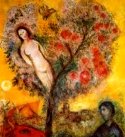
[ Parashat Bereshit is always read on the Sabbath following Simchat Torah, and therefore is the very first portion in the annual Jewish cycle of Torah reading... ]
10.10.12 (Tishri 24, 5773) The very first prophecy of the Bible was spoken to the serpent, namely, God's promise that through the "seed of the woman" would come One who would battle the serpent and ultimately crush the kingdom of Satan (Gen. 3:15). Notice that the promise of the coming "Serpent Slayer" was given to Adam and Eve before their judgment was announced. And even after their judgment was given, "the LORD God made tunics of skin for Adam and his wife and clothed them" - a clear picture of being compassionately "robed in righteousness" imparted by an innocent sacrifice. The very first sacrifice recorded in the Torah - performed by God Himself - prefigured the coming redemption by the "seed of the woman" who would die as a substitutionary sacrifice for their sins.
Note: For more on this, please see "The Gospel in the Garden."
 |
Parashat Bereshit...

[ Parashat Bereshit is always read on the Sabbath following Simchat Torah, and therefore is the very first portion in the annual Jewish cycle of Torah reading... ]
10.09.12 (Tishri 23, 5773) In Jewish tradition, the word "Bereshit" (בְּרֵאשִׁית) can refer to either the first Torah portion of the Bible (i.e., Gen. 1:1-6:8) or to the first book of the Torah itself. When it is used to refer to the Torah portion, it is called "parashat Bereshit," and the text covers the creation of the universe, including Adam and Eve, the subsequent transgression of Adam and Eve, the murder of Abel by humanity's firstborn son Cain, and the increasing depravity of the generations until the time of the calling of Noah. When it is used to refer to the book, however, it is called "Sefer Bereshit," or the "Book of Bereshit," and the text covers everything from the creation of the universe to the descent of Jacob's son Joseph into Egypt in anticipation of the great Exodus under Moses. Note that the ancient Greek translation of the Bible (i.e., the Septuagint) called this book "Genesis," (Γένεσις: "birth", "origin"), a name that was carried over in subsequent Latin and English translations.
The Torah portion opens with this succinct statement about the creative activity of God: "In the beginning (i.e., "bereshit") God (Elohim) created the heavens and the earth" (Gen. 1:1). Note immediately that the Scriptures therefore begin - not from the first person perspective of some man's understanding of God - but from an omniscient third person perspective, a Voice that reveals the Glorious Power that created the entire cosmos by means of His Word. The very first verse of the Bible, then, alludes to the triune nature of God, as further indicated by the use of the plural form of the name Elohim with the singular verb bara (he created). As mentioned before, the word bereshit itself suggests the "head of all things," that is, to the Messiah, the Creative Word of God who is the "Head of all beginning and authority" and through Whom and for Whom all things were created (Col. 1:16; 2:10).
After this breathtaking opening line, shrouded as it is in mystery, the Torah describes how God created the universe yesh me'ayin - out of nothing (Heb. 1:3) over a six "day" period. On the first day God created darkness and light; on the second day He created the atmosphere, dividing the "upper" from the "lower" waters. On the third day He set the boundaries of land and sea and seeded the earth with trees and vegetation. On the fourth day He fixed the position of the sun, moon and stars as timekeepers and illuminators of the earth. Fish, birds and reptiles were created on the fifth day; and land animals, and finally the human being, on the sixth. God ceased from His creative work on the seventh day, and sanctified it as a day of rest: the very first Shabbat...
Note: For more on this absolutely foundational Torah portion, see the Torah Summary page for Bereshit. The Shababt Table Talk for can also be downloaded here....
 |
The Way of the Righteous...
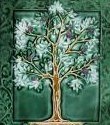
[ The following is related to Simchat Torah and the great value of Torah study for our lives... ]
10.09.12 (Tishri 23, 5773) Our thoughts determine how we see, feel, interpret, reason -- and choose. In a sense, our thoughts express who we really are: they are "inner verbalizations" that reveal our characters. And since our thoughts lead to feelings that are inevitably expressed in actions, our actions ultimately express what we believe (at least at any given moment in time). To change undesirable behavior, we often need to back up and reject erroneous assumptions that underlie and justify our choices. Often the assumptions we believe operate on a "pre-conscious" level of awareness. We must slow down and ask ourselves what we are really thinking and believing whenever we consider the choices we are making. But the two are inextricably linked together: our thoughts determine our actions and our actions express our thoughts...
Psalm One stands as a sort of "preface" to the Book of Psalms by first of all extolling the way of the righteous (i.e., derekh tzaddikim: דֶּרֶךְ צַדִּיקִים) in contradistinction to the way of the wicked (i.e., derekh resha'im: דֶרֶךְ רְשָׁעִים). It is therefore a foundational Psalm that is intended to encourage us to separate ourselves from the ways and customs of the prevailing godless culture (2 Cor. 6:17). Notice, however, that the psalm closes with a great prophecy: כִּי־יוֹדֵעַ יהוה דֶּרֶךְ צַדִּיקִים וְדֶרֶךְ רְשָׁעִים תּאבֵד / "For the LORD knows the way of the righteous, but the way of the wicked is doomed" (Psalm 1:6). Who we listen to matters; how we think matters. Many of us have become so conditioned and influenced by the world that we don't even realize we are under its spell! Refuse the counsel of the wicked; do not heed the propaganda and messages of those who attempt to instill fear within you.
Note: For more on this, please see "Derekh Tzaddikim: The Way of the Righteous."
 |
Delighting in the Torah...
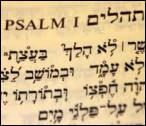
[ Today is Simchat Torah, the festival celebrating both the completion of the year's Torah Reading cycle as well as the start of a new cycle. Thank God for Yeshua the Messiah, our Living Torah! ]
10.09.12 (Tishri 23, 5773) The Scriptures declare: "Blessed is the man who ... delights in the Torah of the LORD (בְּתוֹרַת יְהוָה); all that he does shall prosper" (Psalm 1:1-3). Considering the conspicuous lack of delight for the Torah expressed in most churches today, however, you would almost think that this "blessed state" avowed by the Holy Spirit has somehow been annulled and no longer applies to the Christian... Then again, just as a veil remains over the eyes of unbelieving Jews regarding the message of the new covenant, so a veil remains over the eyes of many Christian theologians regarding the message of the older covenant (2 Cor. 3:14-16). The careful distinctions made by the Apostle Paul regarding the nature of the Torah are often overlooked, with the unhappy result that "antinomialism" (literally, "anti-law-ism") has been inculcated as proper Christian doctrine today. Sadly, for many Gentile Christians today, the Torah is erroneously regarded as an enemy of faith (i.e., "legalism") and therefore is no longer a matter of much delight...
אַשְׁרֵי־הָאִישׁ אֲשֶׁר לא הָלַךְ בַּעֲצַת רְשָׁעִים
וּבְדֶרֶךְ חַטָּאִים לא עָמָד וּבְמוֹשַׁב לֵצִים לא יָשָׁב
כִּי אִם בְּתוֹרַת יְהוָה חֶפְצוֹ וּבְתוֹרָתוֹ יֶהְגֶּה יוֹמָם וָלָיְלָה
ash·rei · ha-ish · a·sher · lo · ha·lakh · ba·a·tzat · re·sha·im
uv·de·rekh · cha·ta·im · lo · a·mad · uv·mo·shav · lei·tzim · lo · ya·shav
ki · im · be·to·rat · Adonai · chef·tzo · uv·to·ra·to · ye·he·geh · yo·mam · va·lai·lah

"Happy is the man who walks not in the counsel of the wicked,
nor stands in the way of sinners, nor sits in the seat of scoffers;
but his delight is the Torah of the LORD, and in His Torah he meditates day and night."
(Psalm 1:1-2)
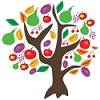
Hebrew Study Card
It is important to remember, however, that while we are no longer 'under' the legal constraints of the covenant given at Sinai (Rom. 3:23), we are nevertheless repeatedly instructed to delight 'in' the Torah and to meditate on its precepts day and night (Psalm 1:2; 19:8; 119:15, 47, 97; Neh. 8:12, etc.). As it is written in Proverbs: "If you seek it [i.e., the wisdom revealed in the Torah] like silver and search for it as for hidden treasures, then you will understand the fear of the LORD and find the knowledge of God" (Prov. 2:4-5). If worldly men seek money and riches for life in this world, should we be less earnest in our pursuit of true and eternal riches?
Where it is written, "all Scripture is breathed out by God (θεόπνευστος / עַל־פִּי רוּחַ אֱלהִים) and is profitable for teaching, for reproof, for correction, and for training in righteousness, that the man of God may be complete, equipped for every good work" (2 Tim 3:16-17), it is evident that the Scriptures referred to here are the Jewish Scriptures (i.e., the Torah, the Prophets, and the Writings), since they are the foundation, the context, and the overarching matrix for the later New Covenant revelation... These were the Scriptures Yeshua used to contextualize and explain his ministry to his followers: "And beginning with Moses and all the Prophets, he interpreted to them in all the Scriptures the things concerning himself" (Luke 24:27; John 1:45). In other words, the Torah has both a logical, a linguistic, and a theological priority regarding our understanding of the New Testament Scriptures, and the failure to read in context invariably leads to faulty interpretations and doctrinal errors of various kinds. "To the Jew first, and [then] to the Greek" (Rom. 1:16) is a principle not only of how the gospel message would transcend ethnic Israel to be offered to all the nations, but also about how we should approach the subject of Biblical hermeneutics.... God "breathed out" (θεόπνευστος) his revelation in order, and the message itself must be understood in light of that order (John 4:22).
The Holy Spirit still speaks to the heart of those who love Yeshua, the everlasting King of the Jews: "Oh how I love your Torah (תּוֹרָה); it is my meditation all the day."
מָה־אָהַבְתִּי תוֹרָתֶךָ
כָּל־הַיּוֹם הִיא שִׂיחָתִי
mah · a·hav·ti · to·ra·te·kha
kol · ha·yom · hi · si·cha·ti

"Oh how I love your Torah;
It is my meditation all the day."
(Psalm 119:97)
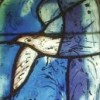
Hebrew Study Card
This verse begins the "Mem section" of the Psalm 119 acrostic. Mem is the letter of "water" (mayim), symbolizing the "spring" of the Torah. In traditional soferut (scribal arts), the letter Mem (מ) is formed from two parts: a Vav (ו) and a Kaf (כ), the gematria of which equals 26, the same value for the sacred Name YHVH (יהוה). The Torah (תּוֹרָה) is central to the revelation of the LORD, just as Yeshua is forever "the Voice of the Living God speaking from the midst of the fire" (Deut. 5:26, Matt. 17:1-3).
Personal note: I've been sick the last couple of days and humbly ask for your prayers. Thank you, chaverim...
Beginning Again, Again...

10.08.12 (Tishri 22, 5773) Each week in synagogues across the entire world, a portion from the Torah (called a parashah) is studied, discussed, and chanted. Jewish tradition has divided the Torah into 54 of these portions - roughly one for each week of the year - so that in the course of a year the entire Torah has been recited during services. The final reading of this cycle occurs on the holiday of Simchat Torah ("Joy of the Torah"), a festival celebrating both the completion of the year's Torah Reading cycle as well as the start of a brand new cycle. Each year, then, we "rewind" the scroll and begin again. The sages have wisely said that you cannot compare studying Torah for the 49th time to studying it for the 50th time.
Since we are about to begin the Torah again for a new year, it is worthwhile to remind ourselves about how the Torah itself begins... In this connection we note that it speaks from an omniscient, "third person" perspective. When we read, "In the beginning, God (אֱלהִים) created the heavens and the earth," we must ask who exactly is speaking? Who is the narrator of the Torah? The very next verse states that the Spirit of God (רוּחַ אֱלהִים) was hovering over the face of the waters (Gen. 1:2), followed by the first "direct quote" of God Himself: i.e., "Let there be light" (Gen. 1:3). The creative activity of Elohim (God) and the presence of Ruach Elohim (the Spirit of God) are therefore narrated by an omniscient Voice or "Word of God." Obviously the Spirit of God is God Himself (who else?), just as the Word of God is likewise God Himself, and therefore the first verses of the Torah reveal the Triune nature of the Godhead. God is One in the sense of echdut, "unity," "oneness," and so on. There can be no sense of "person" apart from relationship, and therefore God's Personhood entirely transcends all our finite conceptions - and yet God forever is One....
 |
Yeshua the Hidden Guest...

[ The following is related to the holiday of Sukkot, the "Feast of Tabernacles," when Yeshua taught the people that He alone could satisfy their thirst for life... ]
10.05.12 (Tishri 19, 5773) The word ushpizin (אוּשְׁפִּיזִין) refers to the seven "mystical guests" who are said to (metaphorically) visit us during the festival of Sukkot, namely: Abraham, Isaac, Jacob, Joseph, Moses, Aaron, and David. According to tradition, on each night a different guest (i.e., ushpiz: אוּשְׁפִּיז) enters the sukkah, and we are to symbolically welcome them by offering them a place at our table (this is similar to the tradition of Elijah's Cup during Passover). On the first night comes Abraham; on the second, Isaac, and so on. Though the origins and date of this tradition are disputed, the Zohar claims that the custom of welcoming each ushpiz was practiced during the Second Temple period.
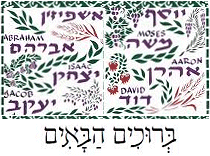 |
In the Gospel of John we read that just before the Festival of Sukkot was to begin, Yeshua's brothers taunted him to go up to Judah to impress his followers there by performing additional miracles and to gain greater fame among the Jewish people (John 7:1-5). Yeshua told his cynical brothers, "My time has not yet come" (John 7:6), which may allude to the idea that he would visit the people "in secret" (ἐν κρυπτῷ), like an ushpiz, later during the holiday. It is interesting that the "Jews were looking for him" at the festival, and there was much "muttering about him" among the people as they talked in their sukkahs. During the "middle of the festival," perhaps on the fourth day (the "Day of Joseph" as ushpiz), Yeshua went to the Temple and began teaching the people, saying: "Has not Moses given you the law? Yet none of you keeps the law. Why do you seek to kill me?" (John 7:19). When the people said he was crazy for thinking this way, Yeshua alluded to the murderous intolerance of the religious leaders who wanted to kill him for healing a man on the Sabbath day (John 5:9). He then turned the tables on his accusers: "If something is done on the Sabbath so that the law of Moses would not be broken, then for all the more reason should something be done to fulfill the intent of the law, namely, the giving of life and healing (John 7:23). He then admonished the people to "judge righteous judgment" (ם־מִשְׁפַּט־צֶדֶק שְׁפטוּ), that is, to look beyond appearances to find the heart of the matter. If the people would do that, they would understand the truth of who was "tabernacling" with them (John 1:1,14).
On the last day of Sukkot, during Hoshana Rabbah, the High Priest led a procession to the pool of Shiloach (Siloam) where he would fill a golden pitcher with water and then return to the courtyard of the Temple. When the High priest would pour out the water, the great crowd of people would wave their lulavot and sing out: "Hosanna! Blessed is he who comes in the name of the LORD!"
אָנָּא יְהוָה הוֹשִׁיעָה נָּא
אָנָּא יְהוָה הַצְלִיחָה נָּא
בָּרוּךְ הַבָּא בְּשֵׁם יְהוָה
בֵּרַכְנוּכֶם מִבֵּית יְהוָה
an·na Adonai ho·shi·ah na,
an·na Adonai hatz·li·chah na
ba·rukh hab·bah be·shem Adonai
be·rakh·nu·khem mi·beit Adonai

"Save us, we pray, O LORD!
O LORD, we pray, let us thrive!
Blessed is he who comes in the name of the LORD!
We bless you from the house of the LORD."
(Psalm 118:25-26)

Hebrew Study Card
It was during this climactic day of Sukkot that Yeshua cried out, "If anyone thirsts, let him come to me and drink. Whoever believes in me, as the Scripture has said, 'Out of his heart will flow rivers of living water'" (John 7:2, 37-38). He further explained that this water would spring forth within the heart as a result of trusting in Him (John 7:38). Likewise today Yeshua cries out, "To all who are thirsty I will give the springs of the water of life freely" (see Rev. 21:6 and Isa. 55:1).
Note: The apocryphal "Book of Jubilees" says that the first sukkah, on which the holiday of Sukkot is based, was built by Abraham when he greeted the three angels who came to tell him his wife Sarah would at last bear a child (Gen. 18:1-10). This is significant, because it links Sukkot with the Akedah (the sacrifice of Isaac). Indeed, the very first time the word "love" appears in the Scriptures refers to Abraham's passion for his son Isaac, whom he was commanded to offer as a sacrifice on an altar on Mount Moriah. The message of a father's love for his "only" son who was offered as a sacrifice clearly prefigures the greater "Akedah message" of the Gospel (John 3:16).
 |
Dwelling in the Presence...

[ The following is related to the holiday of Sukkot, the "Feast of Tabernacles." Chag Sameach! ]
10.04.12 (Tishri 18, 5773) During the holiday of Sukkot we construct a sukkah, a "booth" or temporary structure, that we will "live in" for the holiday week. Living in a sukkah is meant to recall God's surrounding love and care for us as we make our journey through the desert of this world on our way to Zion... On a spiritual level, however, the essence of Sukkot is "dwelling" or "abiding" in the Divine Presence. And though the LORD is forever enthroned in heaven as our Creator, our King, and our loving Deliverer, and though indeed the whole earth is filled with His glory (Isa. 6:3), nevertheless we must make a dwelling within our hearts. He stands at the door and knocks (Rev. 3:20). "Where does God dwell," it is asked, "but where He is given a dwelling place, a sanctuary, a throne within the heart."
Sukkot is about relating to God, trusting in Him, exercising bittachon. The inner is not the outer, and vice-versa. So what good is dwelling in a beautiful sukkah if your heart is not abiding and overflowing with God's love and grace? On the other hand, if your heart is indeed overflowing with God's love, what is a sukkah, after all?
Whether Yeshua is living in you (and you are living in Him) is the most important question of your life upon which everything else turns. As Ravenhill once said, "I don't ask people if they're saved anymore; I look them straight in the eye and say, "Does Christ live inside you?" Therefore we must ask: Are you connected with Him in the truth? Are you "abiding" in the Savior? Are you drawing life from Him, like a vine branch shares the life of the Vine, or are you broken off and in danger of being withered? (John 15:1-6). Such questions center on the true source of your life, the place (ha-makom) or root of your being... Yeshua explained that those who did not abide in Him would be "cut off," a metaphor that is especially sobering, since no one cuts off a branch from a vine or tree to which that branch was never united. Therefore we must always be dwelling in His life, connected to Him every hour, steadfast in our faith...
There are two great questions God always is asking us. The first is "who do you say that I am?" and the second is "will you make a place for me?" Being in a love relationship with God is the goal of life, the "end of the law," and the reason we were created. But we cannot love God apart from understanding his passion for us. The LORD is the "Jealous God," a Consuming Fire, who One desires all of our heart on the altar (Luke 9:23). Therefore the very first commandment is simply אָנכִי יְהוָה אֱלהֶיךָ, "I AM the LORD your God" (Exod. 20:2), because without "making a place" for the LORD within your heart, nothing else will follow.
Addendum: There are times of testing, of course, and these times of "pruning" can hurt. I think we should take the warning about being "cut off" as an invitation to be genuine in our faith. The love of God expressed in Yeshua is nothing to trifle with, yet we trust in the Good Shepherd's guidance. Of Messiah it is said, "a bruised reed he will not break, and a faintly burning wick he will not quench," which means that He is careful to tend to the smallest of ember within the heart of faith. The LORD "gives power to the faint, and to him who has no might he increases strength" (Isa 40:29). Be strong and keep faith; do not allow your heart to fear that you might be cut off. The LORD gives us comfort; I pray you receive that now.
 |
Etrog and Lulav...

[ The following is related to the holiday of Sukkot, the "Feast of Tabernacles." Chag Sameach! ]
10.04.12 (Tishri 18, 5773) During Sukkot we use "four species" that symbolize the fruit of the land (Lev. 23:40). The etrog (אֶתְרג), a lemon-like citron, is used as "the fruit of goodly trees," and is often regarded as a symbol of the heart, of health, beauty, and so on. The sages say the word "etrog" can be seen as an acronym for "faith (אֱמוּנָה), repentance (תְּשׁוּבָה), healing (רְפֻאָה), and redemption (גְּאֻלָּה)." Also, the initials of the words "Let not the foot of pride overtake me" (Psalm 36:12) - אַל־תְּבוֹאֵנִי רֶגֶל גַּאֲוָה - spell the word "etrog," suggesting that the fruit of the humble heart is most beautiful in the eyes of heaven.
If the etrog represents the heart, the lulav (date palm branch) is said to represent the spine or backbone of a person. Notice that the word lulav (לוּלָב) can be broken down as לוֹ ("to him") and לֵב ("heart"). A person who loves the LORD bekhol levavkha, with all his heart, will be given "spiritual backbone," real conviction and strength.
 |
 |
Sukkah of the Heart...

[ The following is related to the holiday of Sukkot, the "Feast of Tabernacles." Chag Sameach! ]
10.04.12 (Tishri 18, 5773) The word sukkot (סֻכּוֹת) is the plural of the Hebrew word sukkah (סֻכָּה), meaning a "booth" or "hut." In traditional Judaism, a sukkah is a temporary structure used for "living in" (i.e., primarily eating meals or entertaining guests) throughout the week-long holiday. The purpose of the sukkah is to remind us of how God tenderly cared for the Israelites as they made their trek through the dangers of the desert. God spoke endearingly to Israel: "Follow me into the wilderness, into an unsown land" (Jer. 2:2).
The Scriptures state, "The LORD upholds all who are falling and raises up all who are bowed down" (Psalm 145:14). It has been said that the word sukkah can be understood as an acronym formed from the words somekh Adonai (סוֹמֵךְ יְהוָה), "the LORD upholds," kol (כָּל), "all," and ha'noflim (הַנּפְלִים), "the ones who fall." This suggests that those who make a sanctuary within their hearts, trusting in God's indwelling Presence, will be upheld and kept from falling (Jude 1:24).
סוֹמֵךְ יְהוָה לְכָל־הַנּפְלִים
וְזוֹקֵף לְכָל־הַכְּפוּפִים
so·mekh · Adonai · le·khol · ha·no·fe·lim
ve·zo·kef · le·khol · ha·ke·fu·fim

"The LORD upholds all who are falling
and raises up all who are bowed down"
(Psalm 145:14)

Hebrew Study Card
The Kotzer Rebbe said that the verse, "this is my God, and I will praise him, my father's God, and I will exalt him" (Exod. 15:2), may be understood as, "this is my God, and I will make a dwelling for Him within me." Though the LORD is forever enthroned in heaven as our Creator, King, and Deliverer, we still make a dwelling within us. He stands at the door and knocks. "Where does God dwell," it is asked, "but where He is given a dwelling place, a sanctuary, a throne within the heart?"
The Grace of Lowliness...

10.04.12 (Tishri 18, 5773) We read in the Scriptures, "If I ascend up to heaven, You are there; if I make my bed in the netherworld, behold - you are there" (Psalm 139:8). The sages comment that if I am proud and believe myself to be high in virtue and godliness, then this signifies seeing the LORD from a distance; but when I am low in my own esteem and feel myself to be unworthy, then I behold Him as near. Ironically, only the lowly are able to comprehend the highness of the Lord, as it is written, "Though the LORD is high, he regards the lowly, but the haughty he knows from afar."
כִּי־רָם יְהוָה וְשָׁפָל יִרְאֶה
וְגָבהַּ מִמֶּרְחָק יְיֵדָע
ki · ram · Adonai · ve·sha·fal · yir·eh
ve·ga·vo·ah · mi·mer·chak · ye·e·dah

"For though the LORD is exalted, He regards the lowly,
but the haughty He knows from afar."
(Psalm 138:6)

Hebrew Study Card
Why did God give us two eyes? One to see your neighbor's virtues; the other to see your own vices... And why did God create Adam last and not first? To teach us that even a gnat was created before man... And why does Torah begin with the letter Bet (בּ) rather than with the letter Aleph (א)? To teach that we don't know the first thing about the Torah...
The Gerer Rebbe asked a young man if he had learned Torah. The man answered, "Just a little..." The Rebbe then said, "That is all anyone has ever learned of Torah."
Rabbi Joseph said, "Always learn from the wise ways of the Creator. For the Holy One overlooked all the high mountains and hills, and settled the Divine Presence upon nondescript Sinai; and He ignored all the goodly trees and settled on the lowly thornbush." Likewise God disguised himself by taking the form of a man, indeed, a lowly slave, and the LORD demonstrated his infinite compassion and strength by dying on a cross for our sins...
The Torah is a vast ocean. As Charles Spurgeon once said, "The doorstep to the temple of wisdom is the knowledge of your own ignorance." The difference between a scholar and a sage is that a scholar says what he knows, whereas a sage knows what he says, and that means a sage is comfortable with silence or by confessing that he doesn't know....
One Day at a time...

10.03.12 (Tishri 17, 5773) Instead of inwardly chafing over the tests and struggles we face in this life, we might look for reasons to be grateful, for how else can we come to know that the Lord is with us apart from his ongoing deliverance? We ask the Lord for our daily bread (לֶחֶם חֻקֵּנוּ), but I wonder if we are not starving ourselves with fear of the future... Daily bread cannot be stored or hoarded lest it become spoiled and rotten (Exod. 16:20). We must live today in complete trust before the Lord our God, who is forever faithful and true. He it is who said, "Don't be anxious about tomorrow, for tomorrow has its own troubles. Live one day at a time" (Matt. 6:34). It makes no sense to worry about the future if the LORD is the Good Shepherd who tenderly watches over your way (Psalm 23:1).
Balance and Being...

10.03.12 (Tishri 17, 5773) An old chassidic tale says that every person should walk through life carrying two notes, one in each pocket. On one note should be the words, "For my sake was this world created," and on the other the words, "I am but dust and ashes." When the yetzer (evil impulse) comes and whispers that you are unworthy before heaven, you must emphatically declare, "I am worthy"; and when it comes to flatter your sense of self-importance, you must say, "I am utterly unworthy." May it please the LORD our God to deliver us from both self-contempt and self-importance; and may He give us each the serenity that comes from true humility... Amen.
What would Jesus do?

10.02.12 (Tishri 16, 5773) When we ask "what would Jesus do?" are we not really asking, "What would Jesus do if we were Him," which of course assumes that we are able to act in a way that is indeed like him? Perhaps it would be more fruitful to ask instead, "What would Jesus do if he were me," since that shifts the focus away from our supposed ability to emulate the Messiah to His ability to empathize and empower us to act in righteousness. In other words, the question is not so much "How can I live like Jesus," as it is "How can Jesus live like me." Similarly, you may say that "Jesus lives within your heart," yet it is more important to know whether you are living in His!
How would you live if you were me, O Lord? How would you be different from me in exactly these circumstances, with my personal history, my DNA, my particular defects of character, accompanied by my tired body of aches and pains? O Lord, you who possess all power, life, glory, and love, my Creator and King: How would you endure yourself if you were me in this present hour? Your great compassion, O LORD God, emboldens me; I believe that are like a father who pities his children, and that you "stick closer than a brother." You call me to abide in you, to share in your life, to know your heart; to walk with you; and surely you were touched with all our infirmities; surely you know the wound of our mortality and bore the sting of death itself, and yet I am unsure how to take hold of who I am, to take hold of your life, despite the presence of my own soul and inner countenance...
Lord, the word for "life" is written in the plural to imply that it cannot be lived alone but must be shared, so help me understand who am I in relation to you... Sometimes I feel like the goal of my life is to go away, to be replaced by your life, as it says, "It is no longer I who lives, but Messiah who lives within me." And yet by the grace of God "I am what I am," and you call me by name, you ask me to open the door, to let you come in to fellowship with me... Grant me wisdom, Lord, about what it means to be "one" with you, and to "dwell" and "abide" in your loving presence... Amen.
So who are you as a new creation in the Messiah? How much of the "old you" remains after the rebirth experience? There seems to be, after all, a connection between the "old" and the "new" that abides, a "transpersonal identity," and it is sometimes difficult to discern what is to be incorporated into our union with Messiah - and what is to be left behind in the tomb...
Strangers in a Strange land...
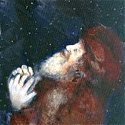
10.02.12 (Tishri 16, 5773) God's people are always "strangers" in this world; they are literally "e-stranged" -- living here, yet not here. Thus Abraham said to the sons of Chet: "I am a 'stranger and sojourner' (גֵּר־וְתוֹשָׁב) among you; sell me a burial site..." (Gen. 23:4), and King David likewise confessed: "For we are strangers with You, mere transients like our fathers (כִּי־גֵרִים אֲנַחְנוּ לְפָנֶיךָ וְתוֹשָׁבִים כְּכָל־אֲבתֵינוּ); our days on earth are like a shadow" (1 Chron. 29:15). Life in olam hazeh (this world) is a place of passing that leads to the world to come. Our faith affirms that underlying the surface appearance of life is a deeper reality that is ultimately real and abiding. It "sees what is invisible" (2 Cor. 4:18) and understands (i.e., accepts) that the "present form of this world is passing away" (1 Cor. 7:31).
כִּי־גֵרִים אֲנַחְנוּ לְפָנֶיךָ
וְתוֹשָׁבִים כְּכָל־אֲבתֵינוּ
כַּצֵּל יָמֵינוּ עַל־הָאָרֶץ וְאֵין מִקְוֶה
ki ge·rim a·nach·nu le·fa·ne·kha,
ve·to·sha·vim ke·khol a·vo·tei·nu,
katz·tzel ya·mei·nu al ha·a·retz
ve·ein mik·veh

"For we are strangers before you
and sojourners, as all our fathers were.
As a shadow are our days on the earth, and there is nothing that abides"
(1 Chron. 29:15)

"Our days are like a shadow, and there is nothing that abides." Therefore we relinquish our attachment to this world and abandon any expectation that we might be immune from the changes and struggles to which our fathers were subjected. The Targum states: "As the shadow of a bird flying in the air of heaven, such are our days upon the earth; nor is there any hope to any son of man that he shall live for ever." Life in this world is a pilgrimage marked by testing and danger (Heb. 11:13-16). As a shadow, so swiftly passing away, are our days upon the earth (Job 8:9; Psalm 90:9, 102:12; 144:4, etc.).
So where is the home you seek? Are you clinging to hope in this world and its counterfeit security? Are you willing to sacrifice your dignity as a child of God for the so-called protection of the "state"? When God delivered Israel from Egypt, it was a rebirth experience. Passover represented the means of redemption (the blood of the lamb), Shavuot represented the revelation of holiness (the Sinai experience), and Sukkot represented the walk of faith. God took Israel out of Egypt (i.e., out of the world) in order to reveal to them who He is -- and who they were in relationship with Him.... The pattern remains the same.
We petition the Lord, "Spread over us the sukkah of your peace," by which is meant the right and good counsel of God's Presence. We desire truth in the inward part and set the LORD always before us; we seek to know Him in all our ways. This implies, however, that we understand that this world - like a physical sukkah - is a temporary abode, a fleeting moment in light of eternity. "All the desires of this world are like rays of light. You try to catch them in your hand only to find there is nothing in your grasp." Sukkot is about abiding within God's shelter and care. There can be no genuine celebration of Sukkot apart from faith in the Divine Presence. God imparts hope even among shadows of this world.
 |
Torah Readings for Sukkot...

[ The joyful holiday of Sukkot runs from Sept. 30th through Oct. 8th this year... ]
10.01.12 (Tishri 15, 5773) On the Jewish calendar, there is a quick transition from the somber time of the High Holidays (Rosh Hashanah through Yom Kippur) to the week-long festival of Sukkot (referred to as "Tabernacles" in the Christian tradition). If the High Holidays focus on the LORD as our Creator, our Judge, and the One who atones for our sins, Sukkot is the time when we celebrate all He has done for us. Prophetically understood, the seven days picture olam haba, the world to come and the Millennial Kingdom age. If Yeshua was born during Sukkot (i.e., conceived during Chanukah), then another meaning of the "word became flesh and 'tabernacled with us" (John 1:14) would apply to the coming kingdom, when the Messiah will again "tabernacle" with us during his reign from Zion.
 |
During the week of Sukkot, the weekly Torah Reading Cycle is suspended, just as it is likewise suspended during the week of Passover in the spring (for a list of the Torah readings, see the Sukkot pages). On Simchat Torah ("Celebration of the Torah") we conclude, and begin anew, the year's Torah-reading cycle: first we read the last Torah portion (Vezot Haberakhah), and then we read the first chapter of the Book of Genesis.
On the Sabbath of the week of Sukkot, we always read the Book of Ecclesiastes (Kohelet). The Talmud (Shabbat 30b) notes that the early sages debated whether to regard this book as sacred Scripture, since it includes skepticism and pessimism about life "under the sun." After considering the matter carefully, however, they reasoned that the vanity of life applies only to worldly pursuits, and certainly not to the way of the Torah, which is "above the sun" and therefore timelessly significant. From the poignant musings of Solomon we learn that it is acceptable to question life's meaning and significance, though in the end we are to seek out genuine spiritual life that promotes true happiness and surrender (Eccl. 12:13-14).
 |
Chag Sukkot Same'ach!
Even amidst the beauty and the special sanctity of the sukkah we understand that this world - olam hazeh - is not our home, and that we strangers and sojourners who still experience the pain of exile. This sober thought is part of the message of Sukkot, too...
סוֹף דָּבָר הַכּל נִשְׁמָע אֶת־הָאֱלהִים יְרָא
וְאֶת־מִצְוֹתָיו שְׁמוֹר כִּי־זֶה כָּל־הָאָדָם
כִּי אֶת־כָּל־מַעֲשֶׂה הָאֱלהִים יָבִא בְמִשְׁפָּט עַל כָּל־נֶעְלָם
אִם־טוֹב וְאִם־רָע
sof de·var hak·kol nish·ma, et ha-Elohim ye·ra
ve'et mitz·vo·tav she·mor, ki zeh kol ha-a·dam
ki et kol ma'a·seh ha-Elohim, ya·vi ve·mish·pat al kol ne·e·lam
im tov ve'im ra

"The end of the matter; after all has been heard. Fear God
and keep his commandments, for this is the whole duty of man.
For God will bring every deed into judgment, with every secret thing,
whether good or evil."
(Eccl. 12:13-14)
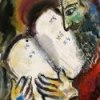
Hebrew Study Card
|
|




























































































